MONDAY,
Up to 50% of high-end homes listed ‘off-market’
By NEIL HARTNELL Tribune Business Editor
UP to 50 percent of high-end, multi-million dollar Bahamian residential properties seeking buyers are being promoted “off-market” rather than publicly via the Multiple Listing System (MLS).
Ryan Knowles, founder and chief executive of Maison Bahamas, told Tribune Business this strategy is becoming increasingly popular among high net worth homeowners because it provides more “discretion and privacy” and enables them to weed out potential buyers who are either not serious or lack the necessary financial means.
He and his company, in a recent e-mail entitled
The Ocean Club Insider, disclosed that 50 percent - or ten - of the 20
• Half of Ocean Club Estates homes for sale not public
• Realtor says sales strategy does not aid VAT evasion
• Wealthy owners get privacy, weed out poor prospects
multi-million properties currently on the market for sale inside Paradise Island’s high-end Ocean Club Estates are being promoted off-market.
Mr Knowles, telling this newspaper that similar trends were also being seen in other gated communities, such as Albany and Lyford Cay, was quick to reject any notion that offmarket sales are a method to avoid the VAT transfer tax on such transactions The Government moved in the 2025-2026 Budget to
tighten administrative procedures surrounding tax payments on real estate sales, estimating the Public Treasury is losing $100m in annual revenues in this area, but Mr Knowles said “off-market” merely refers to how a property is marketed/promoted and has no impact on the conveyance’s execution, recording and tax payment. He added that Maison Bahamas international partner network, Forbes, had already moved to target this area by setting
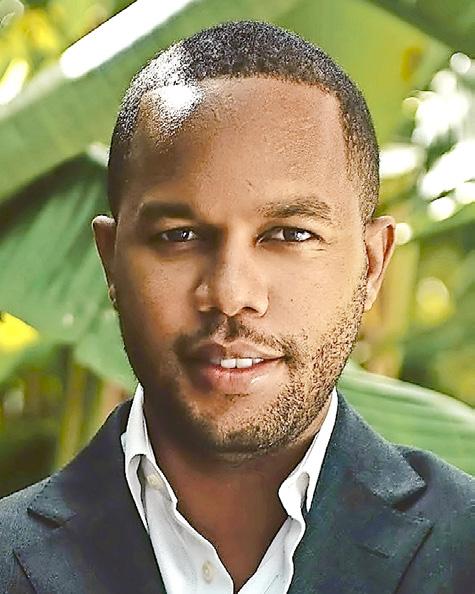
up an online platform dedicated to off-market sales some 18 months ago. Potential purchasers are “vetted, selected and identified” before they even see the subject property to ensure they are serious and have the means to purchase, with all access password controlled.
University ordered to pay ex-finance chief $158,000
By NEIL HARTNELL Tribune Business Editor nhartnell@tribunemedia.net
THE University of The Bahamas (UoB) has been ordered to pay its former finance chief almost $158,000 after the Industrial Tribunal determined there were “glaring discrepancies” in its evidence.
Ingrid Cooper-Brooks, in upholding Ingrid Culmer’s claim for wrongful and unfair dismissal, found the University failed to explain the “conflicting evidence” supplied by senior executives including its former president, Dr Rodney Smith, who “completely
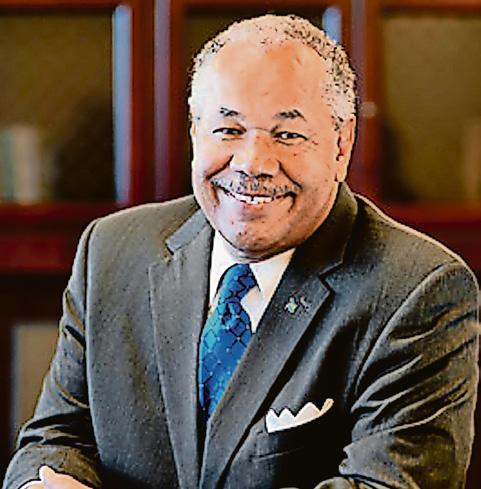
contradicted” the institution’s written submissions by asserting at trial that he was legally responsible for all “hiring and firing”.
AML Foods sees $23m Old Trail blaze payout
By NEIL HARTNELL
AML Foods has received a more than $23m payout from its insurers to cover the damage and loss caused by the mid-April blaze that destroyed its Solomon’s Old Trail and Cost Right stores. The BISX-listed food retail and franchise group, in its fourth quarter and annual results announcement for the period to end-April 2025, disclosed that it had largely received the anticipated insurance recoveries to compensate for the $21m combined loss it suffered due to the fire. Revealing that it had received a $3.5m payout during the two weeks between the fire and its 2025 financial year-end, AML Foods broke down its $21m loss into a $15.8m write-off of its property, equipment and plant, with further $4.1m and $1.1m writeoffs relating to destroyed inventory and what was described as “other firerelated expenses”. Some $24.234m worth of insurance claim income was recorded on AML Foods’ balance sheet at the endApril year’s close, with a $23.1m payout received from insurers subsequent to that date. The payment almost equals the $23.2m VAT-inclusive insurance receivable noted to
Thirty workers fired at Norman’s Cay project
By ANNELIA NIXON Tribune Business Reporter anixon@tribunemedia.net
AROUND 30 employees were terminated by the Norman’s Cay resort development on Friday, senior labour officials confirmed yesterday, due in part to the closure of a well-known restaurant.
Despite the shuttering of MacDuff’s Beach Bar & Grill, Howard Thompson, the Government’s labour chief, told Tribune Business that he sees “light at the end of the tunnel” for the project with the developer having pledged that past “mistakes” in employee and labour relations will not be repeated.
Around ten, or onethird, of those released by Norman’s Cay are understood to be expatriate workers. The traditional summer tourism slowdown, and cancellation of work permits for three senior expatriate executives, are thought to be other factors behind the downsizing exercise. Tribune Business
• Related to MacDuff’s eatery closure
• Labour chief eyes ‘light at tunnel’s end’
understands chefs, bartenders, painters, gardeners and persons working in maintenance were among those terminated.
Mr Thompson said he was “fully aware” of Norman’s Cay planned downsizing having been informed of it early last week. He, along with the minister of labour, Pia Glover-Rolle, attended a virtual Zoom meeting with representatives of the developer, “in particular, their legal representatives”, where it was confirmed that past mistakes would not be repeated.


TARGETING FURTHER FAMILY ISLAND AIRPORT IMPROVEMENTS
By ANNELIA NIXON
THE GOVERNMENT will this week sign contracts for the redevelopment of Black Point airport in the Exuma cays, its aviation chief revealed, with Georgetown’s airport set to receive a new air traffic control tower.
Dr Kenneth Romer, director of aviation, told attendees at the Bahamas Air Navigation Services Authority (BANSA) aviation safety conference that “we have a plethora of several airports that are targeted for opening or for active construction over the next few months” under the Government’s Family Island airport renaissance programme.
Pointing to the launch of the $19.8m airside redevelopment at Deadman’s Cay airport in Long Island, he added that its runway will be extended to some 6,100 linear feet and “the obstacle limitation by that hill” at the runway’s end will be removed. A contract for the terminal building’s construction will be signed in a few weeks.
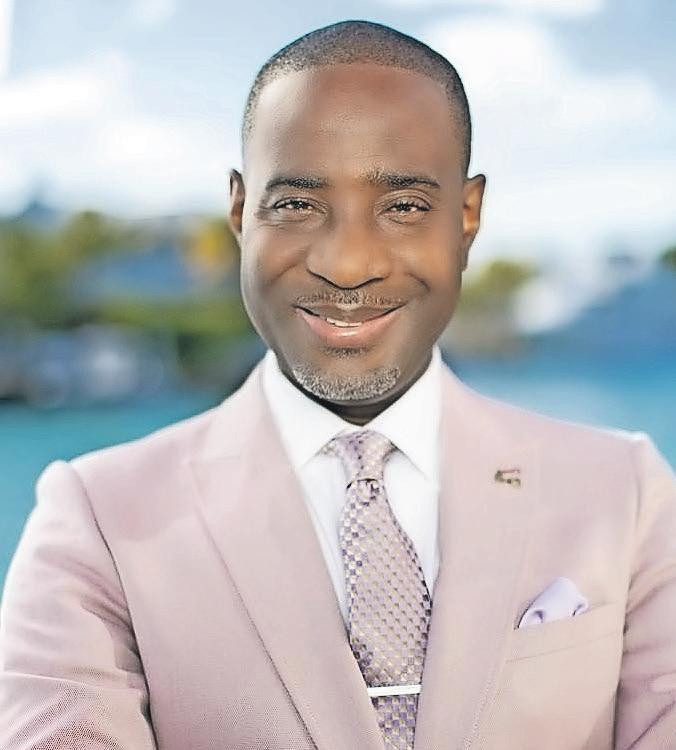
Dr Romer said the Government intends to “formally launch” a High School Aviation Cadets Programme “where exploring the exciting world of ATC [air traffic control] will be one of the core offerings of the curriculum” in the upcoming academic year.
He unveiled plans for a contract signing at Black Point
airport, noting that part of its land side design includes a new control tower funded by BANSA.
“It’s a part of the active, ongoing work for the entire Exuma aerodrome,” Dr Romer said. “The air side work is to be completed by December. That’s funded by the IDB (Inter-American Development Bank).
Construction is taking place on the terminal side, and a part of that terminal land side design is also a new air traffic control tower. And that’s funded through BANSA.”
With North Eleuthera also awaiting a new airport, Dr Romer said site works will begin in August and construction is expected to begin in either September or October. Mayaguana’s airport, according to the aviation chief, has seen completion of major construction to its terminal and preparations are being made for its opening some time in the summer.
“The North Eleuthera airport, the site works will start in August, and the site works would include the clearing, the grading and the pads. And we expect the actual construction schedule, again for September, October. But, in any event, the works will start in August. They’ll start seeing clearing taking place for North Eleuthera,” Dr Romer added.
“The airport in Mayaguana right now is just waiting on the official opening. The terminal has been completed. The major construction of the terminals has been completed. So


we’re only preparing now for the official opening. That’s going to be done this summer. We have a plethora of several airports that are targeted for opening or for active construction over the next few months.
“We have active work going on in New Bight, and Arthur’s Town,” Dr Romer added. “North Eleuthera, a brand new airport that is starting really actively in August. Governor’s Harbour, again, 90 percent completed. We’re about to finalise an airport in Mayaguana. And I said I returned from Deadman’s Cay. We signed a $19.8m contract three weeks ago.
“In a few weeks we’re signing another contract for the terminal. Crooked Island is also getting a new airport. Rock Sound, Black Point, of course, and we’re forging ahead with plans
for Grand Bahama and Andros airports. It speaks again, not just of an isolated approach to aviation, but when we expand these aerodromes and airports that has greater implications as to the oversight and most of it, again, we have more airlift.
“We’re attracting more airlift. And we do know that all of these things impact and, are in discussions right now, with the BANSA in terms of safety. Obviously, the improvements of facilities and the expansion of new airlift to facilitate more foreign and direct travel presents evidence that aviation safety must remain a top priority, and I’m certain that that’s why our discussions over the past few days affirm the Government’s view that aviation safety is paramount.”
STRAW VENDORS ‘PACKED
LIKE SARDINES’ AMID LOWER SALES
By ANNELIA NIXON Tribune Business Reporter anixon@tribunemedia.net
VENDORS at the Bay Street Straw Market are blaming the economy, stall placement and poor market conditions where they are “packed like sardines” for reduced sales and incomes.
Rebecca Small, the Straw Businesspersons Society president, said she has long advocated for the introduction of a shift system in the belief this would improve vendors’ chances of making a profit and overcome assertions that some members are incurring losses because of where their booths are located within the market.
She called for such a system to be reinstated following its use during the COVID-19 pandemic. This would divide straw vendors into separate groups, group A and group B, which work alternate shifts. Vendors would work three days on some weeks, and four days in others.
But, while some vendors back the the idea, Carolyn Wright said such a system will bring challenges, including having to still pay a full week’s rent regardless of how many days are worked as well as possibly working a shift when no cruise ships are docked.
“During the pandemic, there was a rotation where we were divided into A and B, and it was like, say for instance, both of my neighbours on my right and on my left, they were off when I was on,” Ms Wright said.
“The Government did not agree with it. The reason why is because you were only working three or four days out of the week, and you had to still pay the entire full week’s rent. That was the problem there.
“The cruise ship comes in, say Monday is a good day. And then it will fall on the time, like, if you have to work in that rotating shift, on the day when you are supposed to work it’s no ship in the harbour, and then the following day when the other people work is five or six ships in the harbour.”
While Ms Small said 20 percent of Straw Market vendors are doing fairly well, the other 80 percent are struggling to make a profit. Celestine Eneas, president of the Straw Vendors Advancement Association, said regardless of stall placement tourists are not spending as much money as they used to.
“The market is always going to be the market,” Ms Eneas added. “And right now, you see what going on in America? These people buying tickets to come but they ain’t spending no money. I have a prime stall in the market; what they say is [a] prime stall, but ain’t no money spending.
“And then the thing about it is, some of these people that talking, they just reach in the market. They just reach in the market and plenty of them leave their job because they hear money was being made in the market. And so they come now and they expect to reap benefits when you ain’t sow nothing.
“I had to struggle. I been in the market from I was four. I had to struggle to get where I is now. It wasn’t always easy like that. I had a $200 mortgage what I couldn’t pay - $200. Could you imagine? I ain’t call the press. I deal with my situation. I just feel like people feel like it should happen overnight. It ain’t going to happen overnight. You got to struggle.”
Ms Wright said she is “privileged” to have obtained a spot facing Bay Street, adding that the current placement of vendors was based on seniority.
“They had the people who supposed to be the leaders, like the presidents and all who are recognised as leaders in their association, they were able to choose their stalls,” Ms Wright added. “And other people who was fortunate to get on those ends were people like, if you had somebody working in the ministry at the time, or things like that. That’s how people end up on the end stalls.
“And now they fix it where, if a person die on any stall, like if I die, the stall could go to one of my children. Some time ago, they had vacant stalls. Old vendors who been there a long time ago, and they are in the middle or not in a privileged stall, they could ask for a transfer. But that all gone out of the window. They too favouritism.”
Elizabeth “Pinky” Wilson-Robinson, owner of Pinky’s Unique World of Straw, said while her stall is located deeper inside the Straw Market she advertises her business online and reaches out to the cruise lines who would then direct passengers to her. She did, however, accuse vendors on the outskirts of “crossing me to make a dollar” and “blocking” tourists.
“I’m on TripAdvisor,” Ms Robinson added. “I’m on the Google Maps - Pinky’s Unique World Store. You can do it. I’m on The Bahamas trip thing, what they have online, where when persons shopping look for this and I put it in the Straw Market. It doesn’t matter if they come and stop to other vendors, but I just want the people come there and look around.
“Now, the ones on the outside, yeah, they are blocking them from coming in. I sell authentic work only. They’re selling foreign work. And I’m not mad with nobody if that’s what they choose to sell. That’s their choice. My choice is authentic. If I make it, I don’t want to sell it.
“So when I do that, and you selling those knock-offs out there, and you’re telling them: ‘Oh, this the real thing,’ now I have a problem with that. Don’t stop them from coming in. Don’t block them. Don’t tell them there’s nobody else in the back there and crossing me to make a dollar.”
Ms Robinson suggested the introduction of “an authentic market” to reduce competition among vendors selling authentic and other products. “Why
‘SEIZE THE OPPORTUNITY’ OUTSIDE $600M PROJECT
By NEIL HARTNELL and FAY SIMMONS Tribune Business Reporters
THE Grand Bahama Chamber of Commerce’s president is hoping entrepreneurs outside Celebration Key “seize the opportunity” to attract a share of the increased spending brought by Carnival’s guests.
Dillon Knowles, speaking just before the $600m private port attraction officially opened on Saturday, told Tribune Business: “The extra traffic and folks coming to Grand Bahama is always going to be a good thing, and other entrepreneurs in Grand Bahama
need to figure out how to get those folks exiting the park and spend money elsewhere, not just with vendors in the park although we want them to do well.
“We’d like other entrepreneurs in the community to seize the opportunity. We’ll see how it all pans out. They’re [Carnival] also going to need suppliers outside Celebration Key, so obviously it’s going to have a domino effect in that respect but, from a Chamber perspective, we’d like to see more attention provided to the growth of Grand Bahama and not just the vendors at the park and their suppliers.
“Their ultimate goal, I think, is four ships a day with 4,000 passengers per ship,” Mr Knowles added.
“That’s potentially 16,000 passengers a day, maybe five days a week once they get phase two up and running. That’s a significant increase in foot traffic to Grand Bahama and, if we get a significant portion of that spending money in the economy, that will do wonders.
“They’re putting down a sizeable chunk of change so they [Carnival] know they have to make it work, and we have to figure out how to tap into it. ... The vendors at Celebration Key seem to be in great
TOUR OPERATOR HOPEFUL $600M PROJECT ALTERS ‘SLOW’ BOOKINGS
By FAY SIMMONS Tribune Business
Reporter jsimmons@tribunemedia.net
A GRAND Bahama
eco-tourism operator is optimistic a partnership with Carnival’s Celebration Key will change the “slow” bookings pace.
Alfredo Bridgewater, owner of CocoNutz Cruisers, said his company has secured a partnership with Carnival Cruise Lines to offer electronic bicycle tours to guests at its newlyopened $600m private port destination on Grand Bahama.
He added that, due to Celebration Key’s opening this weekend, Grand Bahama is trending online and moving to the forefront of potential visitors’ minds.
“The last few months have been slow, but we’re in the process of working with Carnival. So we’re just a little late and the summer is looking a lot better,” said Mr Bridgewater.
“We are scheduled to be one of the excursions offered directly by Carnival. So that’s a really good thing for us. I think the whole Celebration Key project is highlighting Grand Bahama. We’re trending right now with Celebration Key.
“So even if guests aren’t coming through the cruise ship, Grand Bahama is still trending. We are on the forefront of visitors’ minds, and they may come and decide to be a stopover visitor and stay in the hotel.”
Mr Bridgewater added that although not all Grand Bahama residents will benefit directly from employment or partnerships with Celebration Key, the project will help to stimulate Grand Bahama’s economy by providing residents with more access to capital and visitor spending.
“They’re going to bring in money. So even if you’re not working directly with the cruise ship there will be benefits. You have people that are employed now. Those people are paying
rent, able to pay their cable bills, light bills, all that stuff,” he said.
“They’ll be looking for entertainment. When they get off from work they may go to bars and restaurants. They will support the economy in that way. The property itself will have access to more capital within the Grand Bahama community, and that would have a spillover effect into other businesses.”
Mr Bridgewater said his partnership with Carnival was made possible due to his membership in the National Eco-Tour Operators Co-operative (NETO), which pools the resources of individual entrepreneurs to help the liability insurance demanded by the cruise lines.
Rudy Sawyer, NETO’s president, said the cooperative currently has nine members working with Celebration Key and others working with Disney’s Lighthouse Point and MSC’s Ocean Cay. He explained that cruise lines usually require at least $2m

spirits, and are feeling this is a great opportunity for them. I don’t know what the off-park attractions are going to be like, at least in the short-term, in terms of tours and other ventures of that nature.”
Christine Duffy, Carnival’s president, speaking at Celebration Key’s Saturday opening said the $600m destination had “been more than 25 years in the making”. The destination will be on the itinerary of 20 Carnival cruise ships sailing from ten US home ports. She added that Celebration Key is capable
OPENING - See Page B6
in public liability insurance, which can cost small tour operators up to $15,000 per year - an expense that previously impeded their entry into the market.
NETO allows these small operators to pool resources and obtain coverage for $2,000 to $3,500 annually.
“We found that there was this big hurdle... that if we wanted our tours to be sold on the cruise ships, they all required that all the vendors have public

liability insurance. The amount of cover must be $2m. For small operators, in particular, it’s an expensive insurance to have,” said Mr Sawyer.
“At $2m most small operators will pay between $8,000 and $15,000 per year, which is obviously beyond the point of being affordable. We saw the opportunity for us to be able to get this burden or this hurdle from in front of us by sharing the cost of the insurance,
making this affordable and having these small operators in the market be able to function and be competitive.
“This insurance, which would have been between $8,000 to $15,000, most of our members pay between $2,000 and $3,500 for it.” Mr Sawyer said all NETO members must offer tours in heritage and culture, and have a projected annual revenue of less than $300,000.

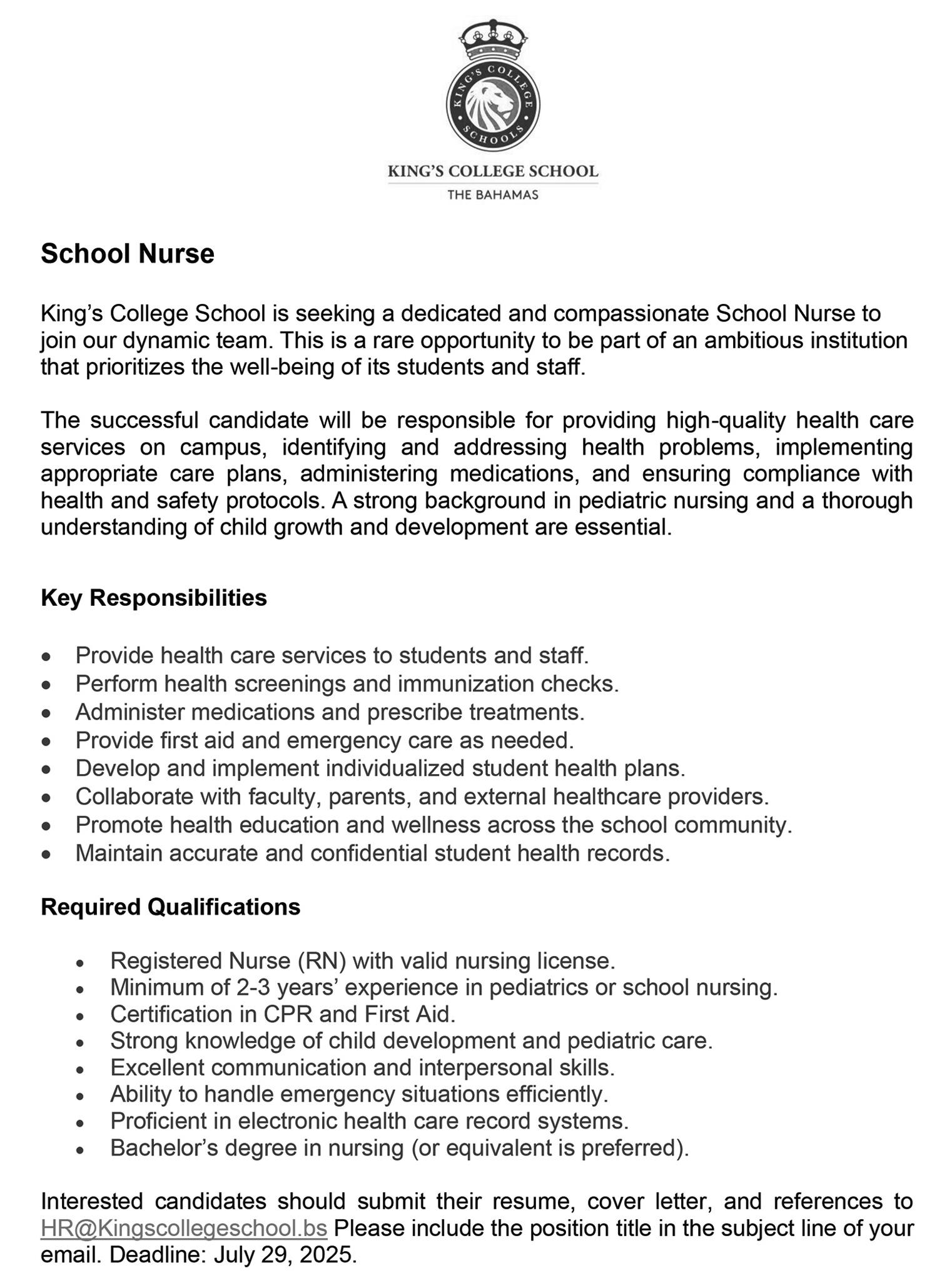
Net insurance boost of $3.18m aids AML profit
PAYOUT - from page B1
receivable noted to shareholders, and the group indicated further that it has also claimed for business interruption coverage due to the fire.
Gavin Watchorn, AML Foods president and chief executive, could not be reached for comment before press time last night.
However, the BISX-listed food retail and franchise group’s results provide the first insight into the extent of the financial losses and damage caused by the Old Trail Road fire.
“As a result of the fire, the company recorded losses totaling $21m, which comprised of $15.8m from write-off of property, plant and equipment; $4.1m from inventory damaged; and $1.1m from other firerelated expenses,” AML Foods said.
“The company’s assets at these locations were insured and, as a result of the losses, the company recorded insurance income of $24.2m net of VAT comprising $20.4m for property, plant and equipment losses and $3.8m for inventory losses.
“As of April 30, 2025, the company received $3.5m of the sums insured inclusive of VAT from insurers. Total receivables from insurers of $23.2m inclusive of VAT are included in the insurance claim receivable on the consolidated statement of financial provision.”
And, signalling that much of the claim has now been paid, AML Foods added:
“Subsequent to April 30, 2025, the company received cash totaling $23.1m, inclusive of VAT from insurers related to the Old Trail Fire...
“The company also has various insurance policies
which cover business interruption losses related to net profit, payroll and various inter-company charges. Any insurance proceeds received from claims on these policies will be reported in the period they relate to subsequent to April 30, 2025.”
The net $3.175m gain, represented by the difference between the anticipated insurance claim income of $24.234m and $21.059m fire-related losses, helped boost AML Foods’ net profits for the year-ended April 30, 2025, to $14.562m - a figure almost triple the prior year’s $4.902m.
And, even if the insurance recovery gain was stripped out, the $11.387m in full-year net income would still have been more than double, or 132 percent, higher than the prior year. This came after AML Foods’ group-wide sales
‘You don’t want people in your business if you can avoid it’
- from page B1
“I think it’s become more and more prevalent in the high-end market in general,” Mr Knowles told Tribune Business of offmarket sales. “I don’t think it’s exclusive to Ocean Club Estates. It’s sellers who want privacy, perhaps want to test the market as they are not 100 percent sure they want to sell, but want to test the appetite among buyers.
“They can do it discreetly and privately while marketing the property to prospects. Selling offmarket really has a lot of benefits. You really filter out the ‘looky losers’, the window shoppers, and you
filter in the qualified serious prospects who are vetted before they are given information on the property.”
Asked how many highend Bahamian residential homeowners are electing to go off-market to promote their properties to buyers, Mr Knowles said the number was in line with that for the Ocean Club Estates. “I would say it fluctuates depending on the neighbourhood, but 30-50 percent is a pretty safe range.
“I think this has really always been there at the very high-end. If you are a high net worth person, more often than not you want discretion. You don’t want your business plastered everywhere. In some cases, you may be selling for
a particular reason - leaving the country or divorce. You want to maintain privacy while getting the home in front of folks who actually want to purchase.
“This has always been there. Now, because of social media, everything gets out there so quickly, and an off-market sale appeals because it’s less public.” Mr Knowles, though, was quick to refute any suggestions that socalled “off market” sales are a device to avoid paying VAT on the transaction.
He pointed out that buyers will still have to secure the acquisition of Bahamian real estate assets by bringing their conveyances for stamping and recording in the Registry of Records, which cannot be
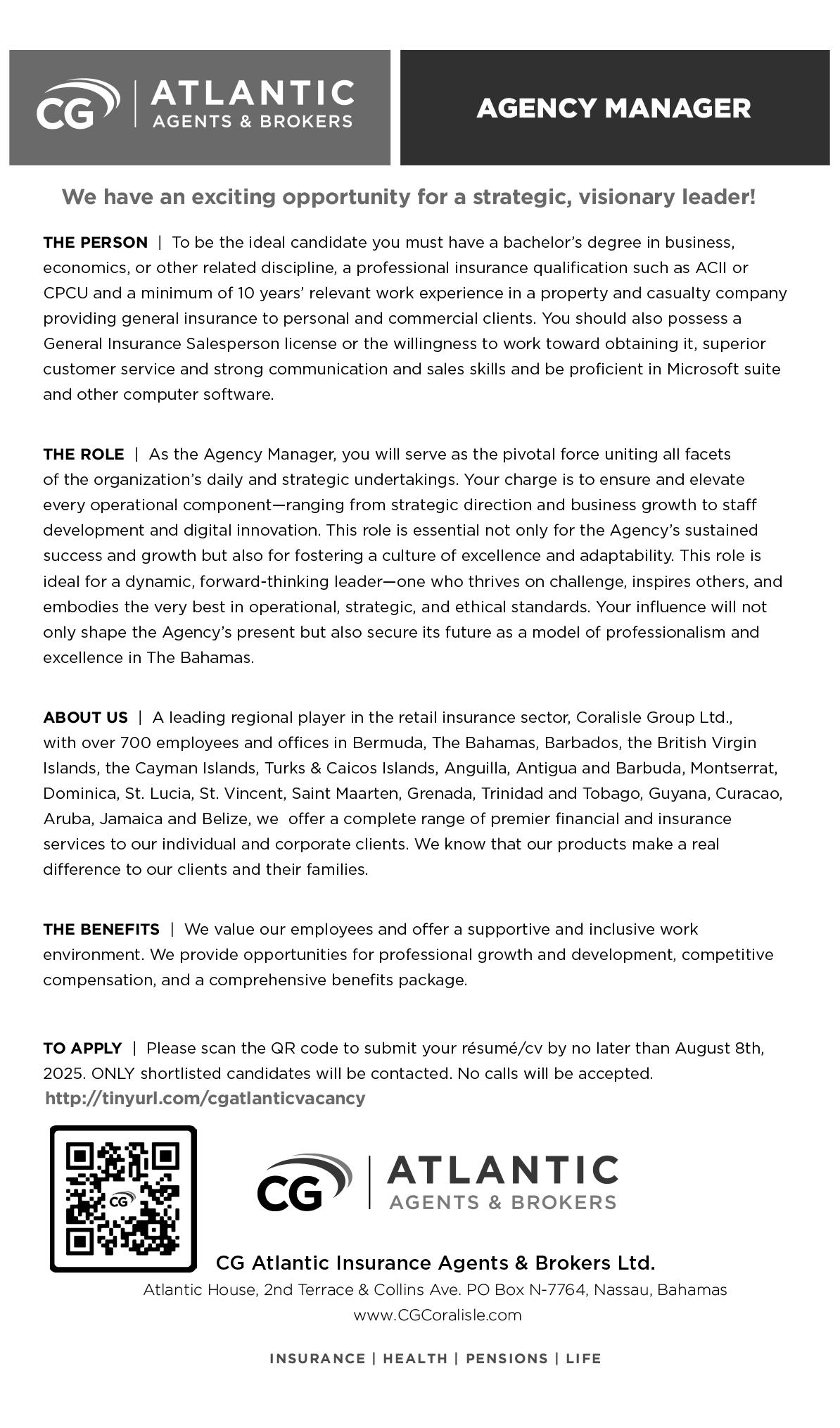
broke the $200m mark for the first time, coming in at $203.01m - some $12m, or 6.3 percent, higher than 2024’s $190.955m.
With gross profits almost $10m higher than the prior year at $69.171m, AML Foods was able to almost double net operating profit to $14.06m compared to 2024’s $7.41m despite a $3.7m jump in general and administrative expenses from $52.639m to $56.381m.
Mr Watchorn, speaking to Tribune Business at the official opening of the remodelled Solomon’s Old Trail store last July just eight-and-a-half months before the blaze destroyed it, revealed then that AML Foods had “expanded our ambitions” to now target becoming a “$300m company by 2030”. This represented a $50m increase from the $250m goal unveiled just three years previously.
It is unclear how the Old Trail Road fire will impact those targets, but Mr Watchorn in his message to shareholders pledged that AML Foods is “committed” to rebuilding an Old Trail road location that
completed until VAT due on the sale has been paid. And the recent measures passed into law alongside the 2025-2026 Budget were designed to ensure these requirements are met.
“Not at all,” Mr Knowles replied, when Tribune Business raised the tax payment concerns some Bahamians will likely have. “The offmarket strategy has nothing to do with the way the property is conveyed. It simply has to do with the way the property is marketed and sold.
“Properties trade all the time without being listed on the market and trade between owners. These are all conveyed the way they are supposed to be. It has no bearing on the conveyance. I also don’t want to give the impression that offmarket is the better way. It comes down to the intent of the seller and what their strategy is.
“In some cases, if there’s a need to sell immediately and urgently, they will probably get a better deal with listing it [publicly]. It
also housed the group’s Cost Right location which had also recently opened in late 2024 following its move from the Town Centre Mall.
Cost Right had occupied the 55,000 square feet formerly used for Solomon’s SuperCentre, and was immediately next door to the remodelled 25,000 square foot Solomon’s Old Trail outlet. AML Foods had invested $22m in acquiring the 80,000 square feet that both its retail formats had occupied, along with the remodel and renovations, prior to the fire striking.
“During the quarter, AML Foods faced a significant challenge with the loss of our Solomon’s Old Trail and Cost Right Nassau locations due to a devastating fire. In response, we immediately activated our disaster recovery and business continuity plans, ensuring uninterrupted operations and maintaining stability across the business,” Mr Watchorn told AML Foods shareholders.
“We are proud of how our teams responded to this unfortunate event. We have retained all team members
also depends on the type of property. It may not be suited to an off-market sale. It’s really on a case-by-case basis.”
Nevertheless, Mr Knowles said Maison Bahamas and its international partner have moved quickly to capitalise on the off-market trend. “We launched about a year-and-a-half ago an off-market platform; Forbes Global Properties launched Forbes Private Office,” he disclosed.
“It’s dedicated to off-market listings. It allows us to market off-market property listings where people have to log-on to participate. Everyone in that system is vetted and selected and cleared beforehand. Everyone looking at that property will be considered as a serious buyer with the means to purchase.”
Giving an insight into how the “off-market” strategy has caught on among wealthy Bahamian homeowners, Mr Knowles said: “I had one owner with a quite substantial estate in Old Fort Bay tell me he
Share your news
The Tribune wants to hear from people who are making news in their neighbourhoods. Perhaps you are raising funds for a good cause, campaigning for improvements in the area or have won an award. If so, call us on 322-1986 and share your story.
from the impacted locations, and demolition work is now underway. We are committed to rebuilding our Old Trail facility and will provide updates on the reconstruction timeline as more information becomes available.”
As for the group’s financial performance, he added:
“These outcomes reflect the impact of our ongoing strategic investments in data analytics, operational efficiencies and customer engagement. By leveraging data-driven insights, we have enhanced our ability to serve customers more effectively, resulting in higher customer satisfaction scores and increased basket size.
“We have also made significant progress in improving in-stock levels, particularly for key items, and in personalising our offerings to better meet individual customer needs. Additionally, we achieved a nearly 50 percent year-overyear reduction in shrink expenses, which also significantly contributed to our improved performance.”
was happy to sell his home, and for me to bring him a buyer, but he didn’t want it publicly listed because he didn’t want his neighbours to question him why he was selling or ask him if he needed money.
“Even at that level you don’t want people in your business if you can avoid it. That’s the appeal of the offmarket platform. You have more and more persons say they want to sell property but don’t want to have it on the MLS” which is operated by the Bahamas Real Estate Association (BREA) and provides an online platform for the listing and marketing of properties.
“I think it’s going to continue to be popular with those folks who, for them, the most important factor is having that private and discretion,” Mr Knowles added. “Having said that, there’s another set of individuals who want it out everywhere; they want it on Facebook, You Tube and Instagram and take it everywhere.
“There are two schools of thought. One is that the more exposure you generate for your property, the better, but if you are dealing with high net worth individuals in a sensitive situation or have a unique asset that will only appeal to certain buyers, it makes more sense [to go off-market]. But for the broader market, you want exposure, and listing it the traditional way is the best way to go.”

BAHAMAS MINISTER SETS OUT SPORTS FISHING INTENT
THE world’s largest sports fishing trade show last week attracted the first-ever appearance by a Bahamian Cabinet minister to promote an industry that generates $170m annually for the economy.
Vaughn Miller, minister of the environment and natural resources, attended the ICAST 2025 event that was held from July 15–17 in Orlando, Florida. ICAST, which stands for the International Convention of Allied Sportfishing Trades, attracts more than 15,000 participants from over 80 countries each year.
Mr Miller told exhibitors, industry leaders, sport fishing enthusiasts and conservation advocates that
The Bahamas is both a premier destination for saltwater fly fishing and leading the way on conservationfirst development models that empower communities while protecting global marine biodiversity.
He described The Bahamas as “a country with a long-standing and deeply rooted connection to sports fishing, particularly fly fishing, which is more than just a pastime”. Mr Miller added: “It is a way of life, a source of livelihood, and has now formally become an established cornerstone of sustainable tourism and conservation for many of our island communities,
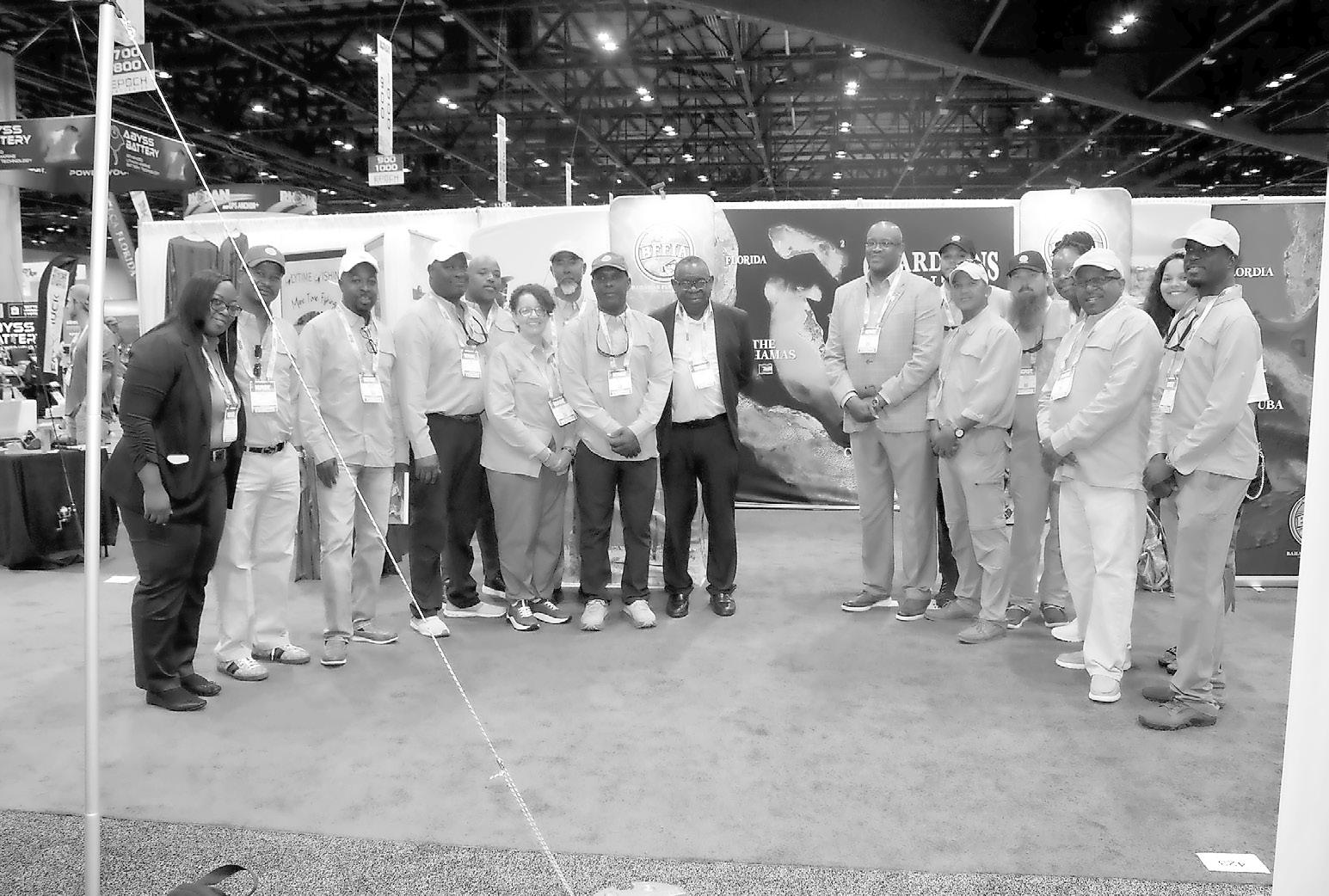
especially those in the Family Islands.
“The Bahamas has the largest flats of bonefish population in the world. As a result of this, we have the largest marine nursery system globally. This is why our turquoise waters are clearly visible from space.”
Sports fishing in The Bahamas contributes between $140m and $170m annually to the economy. It is part of a broader $1.2bn fisheries value chain that accounts for nearly 15
percent of the nation’s gross domestic product (GDP).
The Bahamas, with the flats of Andros and cays of Abaco, is recognised as one of the top fly fishing destinations and is famed for its bonefish and tarpon.
The Bahamas Fly Fishing Industry Association (BFFIA) played a key role in the minister’s presence at ICAST. Though officially established by law in 2012, the Association’s origins date back more than 25 years. It is headed by its
BAHAMAS CLOUD PROVIDER TEAMS OVER CARIBBEAN DIGITAL PLATFORM
A BAHAMAS-head-
quartered cloud services provider has teamed with two partners to create a Caribbean digital ecosystem that supports regional connectivity, innovation and development.
Cloud Carib unveiled its alliance with Blue NAP Americas and Gaia-X during the CANTO 2025 communications conference that was held in Nassau last week. The trip said their partnership will leverage the core strengths of each organisation to deliver a digital platform built by the Caribbean for the region. It will comply with global standards such as Europe’s general data protection regulation (GDPR)
The three companies, in a statement, said that combining the Tier IV-certified infrastructure of Blue NAP Americas with Cloud Carib’s secure managed cloud and cyber security expertise, plus the federated data governance framework of Gaia-X, the partnership will create a platform that empowers governments, business and institutions across the Caribbean.
“With more than 500 industry certifications across our teams, the alliance has the technical depth and global credibility to go toe-to-toe with the largest hyper-scalers,” said Blue NAP Americas chief executive, Giovanni King, “while staying committed to sovereignty and regional priorities.”
The trio added that while Gaia-X sets the rules for safe data sharing, Blue
NAP Americas will provide a secure home for that data.
They added that this will enable the Caribbean to run trusted digital services for healthcare, education, finance and government on its own terms, with global standards and local control. Cloud Carib will offer managed cloud and cyber security expertise.
“This isn’t just about technology; it’s about putting control, capability and confidence back in the hands of Caribbean organisations, built on Caribbean expertise and driven by Caribbean interests,” said Cloud Carib chief operating officer, Victor Kovacs.
“It proves that small island nations can deliver world class, sovereign digital infrastructure, while enabling security without compromising sovereignty.
“Caribbean control of Caribbean data. As Barbados prime minister, Mia Mottley, noted we face growing risks from misinformation and misuse of technology, which threaten the stability of our democracies, and this partnership lays the groundwork to not only validate truth but strengthen citizen security and ensures our region can navigate the digital age on its own terms.”
One of the most pressing challenges in the Caribbean is access to digital resources - and not just infrastructure, but highly-skilled human talent. The three companies said their partnership will bring together one of the largest pools of cloud and
Busy Optometry office in New Providence looking for full time Optometrist
Must have Doctorate of Optometry degree from an accredited college of Optometry or trained at a college of Optometry from the UK. Must be licensed to practice in country of training. Must be proficient in OCT and Humphrey’s Visual Field.
cyber security professionals in the region.
Gaia-X’s involvement brings international credibility to the partnership. Backed by global organisations such as Airbus, Bosch and Deutsche Telekom, Gaia-X collaborates with partners capable of upholding the highest standards for data sovereignty, security and interoperability.
“The fact that Gaia-X is investing in the Caribbean is a clear vote of confidence in the region’s maturity and readiness to compete on the world stage,” said Gaia-X chief operating officer, Roland Fadrany. “This alliance is not only regional, but also globally significant.”
president, Captain Prescott Smith, and vice-president, Denny Rankine.
“They have paved the way and have suffered for that leadership,” Mr Miller said. “They have shown us that building from the ground up is the best way of bringing about their new model of conservation and empowerment, which my government fully endorses..... Their hospitality is second to none, their expertise is world class, and their commitment
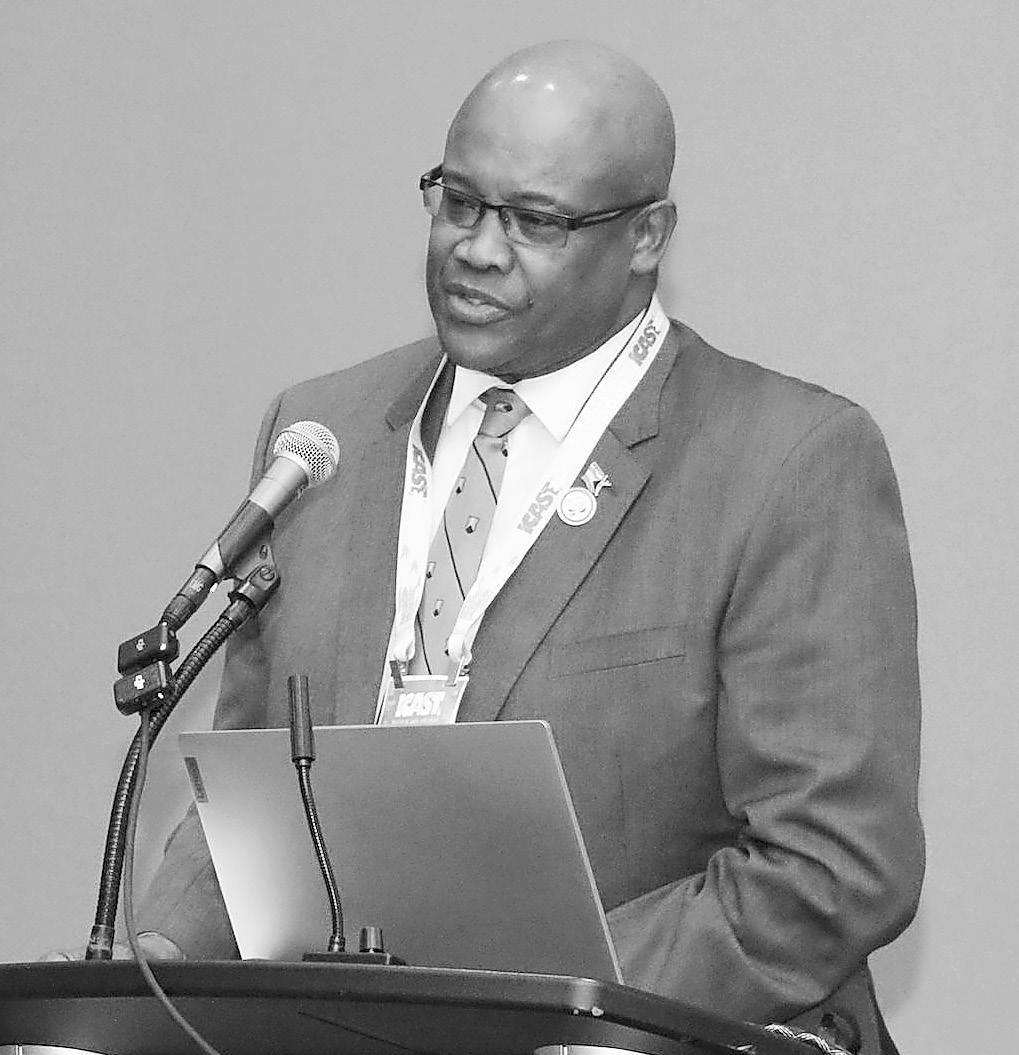
to conservation is unwavering.”
The Government earlier this year announced a new agreement, backed by the Association and supported by the Environmental Defense Fund, to begin restoring blocked creeks and degraded marine nursery systems across the islands.
“I wish to publicly call on all of you to assist us in that endeavour,” Mr Miller told attendees. “We must be good stewards of what we
have, so that it is sustained for all of us and, if I dare say, you global entities to enjoy and benefit from. Let us continue to cast together — for fish, for the future, and for the generations yet to come.”
Now in its 68th year, ICAST is produced by the American Sportsfishing Association and serves as the global headquarters for sports fishing commerce, manufacturing innovation and discussions on


University case undermined from ‘conflicting evidence’
DISCREPANCIES - from page B1
This, the Industrial Tribunal vice-president ruled, “seriously undermined” the University’s professed reasons for terminating Ms Culmer. Ms CooperBrooks found it had “failed to demonstrate just cause” for firing her, and breached the former finance head’s fixed-term contract by failing to show it “honestly and reasonably” believed she was guilty of misconduct sufficient to justify her dismissal.
Ms Culmer launched her wrongful and unfair dismissal claim after she was terminated on February 26, 2021. Her firing came after she and the University hit a “stalemate” over negotiations for a new contract following her appointment as acting vice-president of finance in January 2019.
Initially hired by the University as its financial controller for finance and business enterprises on June 5, 2018, Ms Culmer was engaged on a three-year, three-month fixed-term employment contract that was due to expire on September 4, 2021. Her annual salary was $126,690 inclusive of benefits.
Her promotion to acting vice-president of finance and business enterprises occurred just seven months later, with Ms Culmer’s responsibilities expanded to include all accounting operations. She was confirmed in the post on August 27,
2020, with the appointment made retroactive to January 1 that year pending completion of a new employment contract.
“Contract negotiations commenced in September 2020, but soon reached a stalemate over salary and contract duration,” the Industrial Tribunal noted.
The University offered Ms Culmer a $126,025 annual salary, which was $665 less than what she had earned previously, and a fixed three-year contract.
The former finance chief, though, countered by seeking an annual salary that was almost $22,000 or 17.4 percent higher at $148,000 and a fixed four-year term.
The University made a final $138,628 offer, which was 10 percent more than its original but $9,372 below Ms Culmer’s position, but stuck to the three-year term with one retroactive.
Ms Culmer rejected the University’s offer on February 4, 2021, which brought negotiations between the two sides to a halt. Then, just three weeks later, the University terminated her employment “for loss of trust and confidence” in her work, using clause 13 in her first contract - which still had six months to run - to justify its actions.
“The termination letter cited various acts of misconduct during her tenure,” the Industrial Tribunal recorded. “The applicant [Ms Culmer] contends that her dismissal was wrongful and unfair, and seeks damages in
compensation or, alternatively, reinstatement.”
The termination letter, which bore Dr Smith’s name in his capacity as the University’s then-president and chief executive, “cited various reasons for the applicant’s dismissal, including poor interpersonal relationships, management deficiencies, refusal to attend training, criticisms of the University’s systems and the failed contract negotiations”. It offered Ms Culmer three months’ severance pay.
Dr Smith, in his letter, alleged that Ms Culmer’s January 5, 2021, written reply to the University’s contract offer contained “several gravely intemperate remarks” alongside a demand that she be paid “at the top of the salary range for the position” at $148,000 per annum.
The University, in its counter, said it determined it could only raise the salary offer by 10 percent of $12,600 while the three-year term was consistent with all vice-president employment contracts. After Ms Culmer rejected the final offer, Dr Smith listed “various material concerns” regarding the operation of the university’s finance and business office.
These, he alleged, included the dismissal of an employee without informing the University’s human resources department; “a significant overpayment” made to a member of staff; “employee deductions that should have been discontinued but were not; the alleged “co-mingling of
Fears taxi fares will deter visitors from off-property
OPENING
- from page B3
of accommodating Carnival’s largest vessels, including the biggest in its fleet through 2029, and work is already underway to expand berth capacity from two to four ships.
Ms Duffy said “more than 1,200 Bahamians” had been hired to build and operate
the destination, enabling many who had been forced to leave the island by Hurricane Dorian in 2019 to return.
Meanwhile, a Grand Bahama dive operator echoed Mr Knowles by confirming Freeport business owners are waiting to see if guests will venture outside Celebration Key. Karen Rolle, owner of Sun Odyssey Divers, said that while
she is confident the destination will attract a large volume of guests she is unsure if they will choose to venture out into the wider Grand Bahama.
Speaking to Tribune Business, Ms Rolle revealed that an updated price sheet for taxi transportation from Celebration Key to Freeport listed the 45-minute drive as $50 per person when traveling in


grant and donated funds” in
the University’s operating bank account; and delays involving their “critical” reconciliation;
Dr Smith also alleged that “numerous serious complaints” had been made about Ms Culmer by her colleagues, peers and the trade unions representing University of The Bahamas (UoB) staff, and accused her of “continuously criticising the University’s data management system” which he described as “one of the most advanced” in the world and used by 5,000 colleges and university.
As a result, Dr Smith said he and the University’s Board had decided to invoke clause 13 in Ms Culmer’s existing employment contract and terminate her “upon a basis of a loss of trust and confidence”. This clause stipulated that such a determination had to be made by both the University’s president and the Board.
Ms Culmer and her attorney, Camille Cleare at Harry B. Sands & Lobosky, argued that the University had “neither provided sufficient grounds” for her dismissal not “adhered to proper procedure” by ensuring the decision was made by both Dr Smith and the Board.
The former finance chief also asserted that Dr Smith’s February 2021 report to the University’s Board, the last before her dismissal, did not mention any alleged misconduct or a recommendation to terminate her. And neither the Board, nor the University’s executive committee, authorised her termination.
“Notably, Dr Smith admitted in cross-examination that he did not
small groups - a cost that could deter some cruise ship passengers.
“Celebration Key just opened and there’s going to be a lot of people. Freeport is just waiting to see how many of those people are actually going to come into Freeport,” said Mrs Rolle.
“We got a sheet with what the taxi transportation is going to cost. If they have six or more, it’ll be $20 per person. But if it’s only one to two people, it’ll be $50 each way. If you only got two people, that would be $200 round trip. I don’t know how many people are going to pay $100 round trip to come into Freeport for an activity.”
Ms Rolle added that Celebration Key is not located close to any local businesses, and she was doubtful that many cruise passengers will spend up to $50 for a taxi ride into
recommend her termination, nor was there any decision made by himself, the Board of Trustees or executive committee to dismiss the applicant, and she had not been dismissed by the Board,” the Industrial Tribunal said of the former president’s trial evidence.
“Instead, he chose not to proceed with contract negotiations for the vice-president of finance position. Additionally, he conceded that he did not advise the Board members to consider the actions outlined in the termination letter to determine whether [Ms Culmer] should be dismissed due to a loss of trust and confidence.”
Dr Smith also conceded that if a new employment contract had been negotiated “they might have been able to address some of his concerns” over the University’s finance department. Ms Culmer, though, was quick to seize on this and challenge the justification for her firing given Dr Smith’s admission “that he neither contemplated nor intended her dismissal”.
As a result, she argued that the University breached her employment contract by wrongfully terminating her without providing a chance to contest “such serious and widespread allegations” of misconduct. Its failure to do so meant it could not meet its burden of showing it “had a genuine and honest belief” Ms Culmer was guilty of the allegations.
Although the University stuck to its position that it was entitled to dismiss her for “a fundamental breach” of contract, Ms CooperBrooks and the Industrial Tribunal found in favour of the former finance chief.
Freeport. “In Nassau there’s a better chance of them walking around and spending some money, because downtown is small and close to the cruise port,” said Mrs Rolle.
“Celebration Key is a 45-minute drive into Freeport, and the only thing you have is Celebration Key out there for them to walk around and see. There’s no place that they could walk to see local Bahamian businesses. It’s a taxi ride, it’s a fee, and the majority of them are not going to pay the money. They may pay $10 one-way or $20 oneway, but they’re not going to pay $50 one-way.”
Mrs Rolle said bookings are down from last year, and the uncertainty surrounding upgrades to Grand Bahama International Airport is preventing increased airlift to the island.
“The numbers are down.
For one thing, our airport has still not been taken care of. They keep getting on the news, talking about what they doing and how much money they spending on Grand Bahama’s
“It is noted that there are glaring discrepancies in the respondent’s submissions regarding the reasons for the applicant’s dismissal and the admissions by Dr Smith, the respondent’s prime witness, who stated that he is statutorily responsible for hiring and firing in complete contradiction of those submissions,” the Industrial Tribunal found.
“The Tribunal is of the view that, even if the respondent [the University] had legitimate grounds for terminating the applicant, any such grounds have been seriously undermined by the respondent’s conflicting evidence, casting doubt on the defence. Notably, despite vigorously defending the termination, the respondent has not addressed the Tribunal concerning the conflicting evidence.
“Having regard to the foregoing, the Tribunal finds on the facts that the respondent failed to demonstrate just cause for the applicant’s termination for loss of trust and confidence as stipulated under clause 13. That is, by the reasons provided for the applicant’s dismissal, as well as the manner in which the termination was executed.”
The Industrial Tribunal ruled that the University not only breached Ms Culmer’s contract but wrongfully terminated her employment. It awarded her $138,374 for wrongful dismissal, including $67,730 as early termination compensation; $33,500 for accrued vacation and the balance owed under her contract; and $23,884 in pension contributions. Another $19,484 was awarded for unfair dismissal.
airport. That’s a bunch of bull. It still looks like crap. And we can’t get the airlift in here that we need to get in here. Cruise ship passengers don’t spend the money that stop over passengers spend,” said Mrs Rolle.
She added that stopover visitors are also needed to drive traffic at the Port Lucaya Marketplace, where vendors have frequently complained about the decline in business and visitor numbers.
“Port Lucaya is already drying up because of the hotel there and all this big talk, but they don’t anticipate anything until maybe 2028. This is 2025. How long can those small vendors hold on out there with making less than $100 a day, and some of them less than $100 a week? I know a vendor personally, and some days she doesn’t even open any more. She says it doesn’t make sense. She doesn’t even make money to pay for her gas to drive there,” said Mrs Rolle.
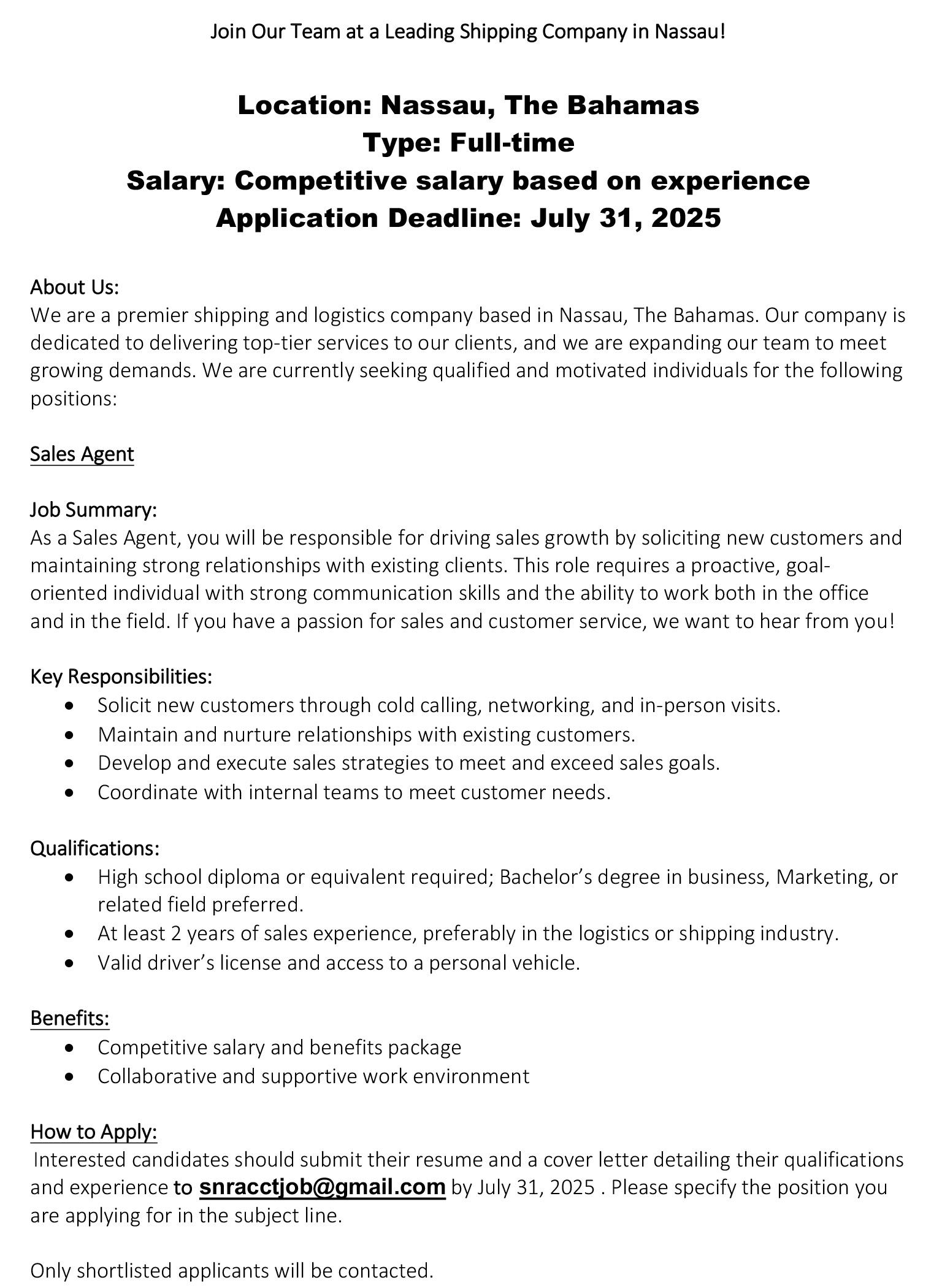
Vendors lament Bay St market conditions
SYSTEM - from page B2
not make an authentic market divider? The same way you had wood carvers divided; they had the wood carvers in the back,” she argued.
“Put us in an area and call it ‘Authentic Market’.
Whereas we don’t have to struggle with everybody else who wants to sell sweatshirts, t-shirts, knockoff bags. We don’t have to hustle up with them. If I sell a souveniur, I made that. I do clay stuff and all. My daughters, they are creative people. We’re a family of creating things. If we ain’t make it, we ain’t selling it.
“I’m not cutting no roads.
I ain’t cleaning no sidewalk, and I ain’t building no building. So why the hell you calling me Ministry of Works. And that has been like that from my grandmother was in the market and I’m the fourth generation of straw vendors. I will appreciate us under the
Ministry of Tourism. That will give us our proper recognition. That will make us be sensible out there.”
Another vendor, Joyann Bethel, added that the Straw Market could use some advertisement. “They need to really advertise the Straw Market much better because numerous times folks, I would say, they have wandered off and end up in here by accident - those who are first timers. And those who know of the market, they come back. But it’s not really being promoted much,” she added. The vendors agreed that the working conditions and overall appearance of the Bay Street Straw Market also impacts the amount of tourists willing to stop and shop. They complained of the heat trapped in the market due to the absence of a cooling system and a lack of ventilation.
Ms Eneas said: “When the tourists come in, they don’t want to stay inside because
the market is too hot.”
However, she added that she understood money has been allocated in the Budget “to get some cooling in there.”
“I hope that it don’t have to go to tender where it will take another ten years,” Ms Eneas added, “because some of us will die because the market is too hot. And I really and truly appreciate them for doing that, but [if] they could speed it up, it’ll be really appreciated.”
The restroom is another concern. Vendors said for a time they had to wash their hands using bottles of water. They added that they often have to call custodians to replace toiletries, and the lavatories are generally left filthy with unpleasant odours.
“Because of me being right there on Bay Street, many tourists walk right up to me and say: ‘Can you tell me where there’s a public restroom,” Ms Wright said. “And I say ‘all the way to the back of the market, to
Terminated staff challenge how downsize was handled
TERMINATION - from page B1
Mr Thompson said his officials will contact the laid-off staff to help them find new employment. They will also visit the remaining workers on Norman’s Cay “at the earliest opportunity to discuss matters with them, and to allay certain fears and concerns they may have, and to assure them that we are aware of the future reorganisation and development of the Cay”.
“It was a very productive virtual meeting where past mistakes by the company were admitted, and a firm resolution for those mistakes to never happen again was confirmed to myself and the minister,” Mr Thompson added.
“We then discussed the number of persons to be affected, and we were provided with a list of those persons including their telephone contacts. So, therefore, it is my intention and the intention of my team at the Department of Labour to start contacting those affected persons to assist them with finding alternative employment.
“We are quite confident they will be able to find alternative employment given the fact that there are so many job opportunities in the hotel and tourism sectors in The Bahamas.”
Mr Thompson said neither himself nor his department expects “to receive any further complaints from any of the workers on Norman’s Cay regarding their treatment and breaches of the Employment Act or the Health and Safety at Work Act”.
He added that he was advised Norman’s Cay will see improvements, and there will be more job opportunities available for Bahamians by “late October, early November” which is a busier time in the Bahamian tourism calendar.
“To directly address and resolve all of the issues that plague Norman’s Cay necessitated a full reset and recalibration by the owners and developers, which I support because - moving forward - I nor my department expect to receive any further complaints from any of the workers on Norman’s Cay regarding their treatment and breaches of the Employment Act or the Health and Safety at Work Act,” Mr Thompson said.
“We were advised by the representatives of the company at the Zoom meeting that with the closure of one of the restaurants, and coming into the slow season, that the downsizing was necessary and would have allowed them the opportunity to do a lot of remedial work, in particular, as it relates to the employee housing and communal living accommodations.
“We were further assured and advised that by the time the season picks up in late October, early November, we would be seeing the new
improvements as well as there will be a new opportunity to engage and hire more Bahamian workers,” the Government’s labour chief continued.
“I am satisfied that there is indeed light at the end of the tunnel, and I am committed to ensuring that Bahamians have the first opportunity and that they are treated with respect and dignity, and all employment and labour laws of The Bahamas are strictly adhered to.”
The downsizing has occurred just weeks after landing and parking fees at the Norman’s Cay airport were adjusted and increased, including the introduction of a new $2,998 “VIP fee excluding VAT” that is said to be “mandatory for all jets” and “optional” for all other types of aircraft. This fee will not apply to hotel and marina guests or club members.
The adjustments appear designed to reduce landing fees, in particular, for international flights that bring in tourists while raising those for local flights.
As an example, a local flight involving a 20,000 pound jet will now incur a $798 landing fee as opposed to the $437.80 it has faced since July 2024 - an 82.3 percent increase. But, for an international flight involving the same plane, the fee has dropped from $1,549 to the same $798.
Customs and Immigration fees have been slightly lowered, with overnight parking rates also eased slightly for most aircraft apart from jets weighing between 15,000 and 20,000 pounds and those over 30,000 pounds.
Meanwhile, Chef Diallo Osoria, one of the staff terminated on Friday, who used to work at MacDuff’s, said: “Several months prior we were informed of impending changes to our work schedules, specifically a reduction from our standard 40 to 48 hours to a mere 20 hours per week.
“For those of us stationed on the Cay, working a demanding seven days a week for five-week rotations, a 20-hour workweek translates to, at most, two to three days of actual work. Such a reduction renders our presence on the Cay for the remainder of the week economically impractical, and severely curtails our ability to seek alternative income-generating opportunities.
“During subsequent discussions regarding this proposed reduction, I, along with others, conveyed our understanding that such a drastic alteration to our terms of employment, fundamentally changing our living arrangements and modus operandi could, under the provisions of Bahamian Labour [law], be construed as a redundancy.
Despite initial denials of an intent to reduce hours to such an extent, the mass lay-off that transpired yesterday regrettably confirms
the back’. And let me tell you who all use that. If you ever stand in the back there, you’ll find the taxi drivers will use it. You’ll find everybody use it. Everybody who passed in the back there, use the toilet.
“You have to call them [custodians] and tell them the bathroom needs to clean or the tissue is out. You have thousands of tourists and people walking in and out that bathroom every minute. It looks so bad. Let me tell you something. You should see when they clean the mop bucket sitting right there. Then if the toilet out of order, it have a big garbage bag cover... one of the doors break down. The place look terrible.
“The people who were hired to bring in the thing for the sanitary napkins, the female sanitary napkins, they come in like, I believe, once a week. You could imagine, once a week for thousands of people, young women who have a period. You know how blood smell? You could imagine how that is when they come to... and sometime it’s overfull. I just is walk in and walk out. I don’t have nothing to say because you get to a point
where you just don’t be heard.”
Ms Wright said the Straw Market set-up also poses a problem, adding: “If you ever come inside that market, you will see the stalls that [are] in the centre. They have a door. The ones who on the left hand side have a door and the door swings open.
“Now they supposed to be within that door. Now they are outside the door, and they put their chair... Let me tell you something, If you ever come to that market on a day when six ships in the harbour, you could hardly walk. You could hardly walk,” she added.
“When the market first opened, when it was first built, they had these stalls... what was supposed to be demonstration booths. So people could’ve come and see how the straw is made, people plaiting and people stitching and making different stuff. Well, that went right out the window. Next minute they had people selling food.
“As the Government change, different things happen. If the FNM come in, they do one thing. When the PLP come in, they do another thing. So right now
they gone and take them same booths, and they gave people the booths. Those booths had a little porch and then they had made some benches for the tourists to sit down. Like, you know, when women shopping, men will want to sit,” Ms Wright added.
“Well, then the straw vendors were sitting all over the bench, and they couldn’t get them to move. And when they ain’t sitting on the bench, they put work on display things on the benches. So people move all the benches, and they put the vendors in the booths. And now those vendors come off the porch, and in the centre. They all set right up, and the place is a mess.”
Ms Robinson said vendors are “packed like sardines” and some should be moved out.
“Move some of us out. Move some out of there,” she added. “Instead of having that one booth, that little one tiny booth, let us have two booths and a space for another person. Two booths, one person. When they pile up like that, you can’t see nobody. We’re too piled up. We look like sardines in a can.”
the trajectory we had foreseen.”
Mr Thompson added:
“We will inquire further into this complaint, but I suspect it has a lot to do with the recent closure of the restaurant MacDuff’s and with the loss of business, I am told the company sustained, over the course of the last two months.”
The investigation and inspection conducted on Norman’s Cay a few months ago led to three senior expatriate executives’ work permits being cancelled, which Mr Thompson said “would have impacted the fiscal and business side of their operations”.
However, to his understanding, “a very significant and persuasive proposal and development plan for the restructuring and continued development and expansion of the property was unveiled to the senior members of the Government”.
“We are fully aware of the downsizing exercise that occurred on Norman’s Cay on Friday past,” Mr Thompson said. “We understand 30-odd persons were affected, including about 10 foreign workers. The situation at Norman’s Cay is complicated. However I do see light at the end of the tunnel.
“As you are aware, the Department of Labour and the Department of Immigration - along with the use of the Royal Bahamas Police Force plane - would have conducted an investigation and inspection on Norman’s Cay a couple of months ago.
“That resulted in three senior expatriate executives’ work permits being cancelled. Since that day,
the development including the hotel side was being run and operated without senior executives or representatives of the owners of the development, and you can appreciate this would have impacted the fiscal and business side of their operations,” he added.
“Since then, I was advised, the owners - along with their attorneys - would have had a private meeting with senior members of the Government where all issues were discussed including the company’s proposed ongoing development of the Cay.
“It is my understanding that a very significant and persuasive proposal, and development plan for the restructuring and continued development and expansion of the property, was unveiled to the senior members of the Government.”
Ty Glinton, a maintenance worker terminated from Norman’s Cay on Friday, said he was not provided a reason for his firing. He added that those who were terminated were treated like criminals due to the presence of police escorts.
Another source, a painter, speaking on the basis of anonymity, agreed and claimed Norman’s Cay still has many foreign workers who do not possess work permits. Mr Glinton spoke of being given a short window of time between being informed of his termination and packing his belongings to catch a flight off Norman’s Cay.
“We were afforded a mere two hours to gather our personal effects,” Chef Osoria added. “Furthermore, the notification regarding our flight departure at 10.45am was delivered at approximately 9am, allowing barely an hour’s notice.”
Mr Thompson said when calls are made to the impacted persons, he will
further inquire about the allegations of police presence and the short period of time provided for persons to gather their belongings.
Chef Osoria, though, called out what he considers questionable labour practices within the development that preceded the terminations.
“For a period, Norman’s Cay sought to classify itself in a manner that allowed it to skirt the standard 40-hour work-week for overtime eligibility,” Chef Osoria added. “They attempted to operate under an exception that is typically afforded to hotels, despite not being a conventional hotel establishment.
“This effectively meant that we were often required to work up to 48 hours before qualifying for overtime pay. Only after we brought this discrepancy to light, asserting our rights under standard labour practices, did they revert to the customary 40-hour work week as the threshold for overtime.
“Furthermore, their compensation practices on public holidays were, to say the least, unorthodox and unfair. For instance, if one worked 10 hours on a public holiday, only eight of those hours would be compensated at the legally mandated double-time rate,” he alleged.
“The remaining two hours would be paid at a regular rate, effectively denying us the full holiday premium that is common practice and enshrined in labour regulations. Such tactics are a clear demonstration of a pattern of behaviour that seeks to minimise employee benefits at the expense of fair and transparent compensation.
“While I personally welcome this transition, contingent upon the appropriate and timely disbursement of my earned remuneration, the process
by which these lay-offs were conducted was undeniably unprofessional and, frankly, unjust. Many of us have dedicated years of our lives to Norman’s Cay – in my case, two years, and for others, upwards of five years. During this time, we have established roots, accumulated belongings and invested our professional lives.” Chef Osoria said the termination letters “failed to stipulate the exact severance or redundancy pay we were to receive – a fundamental breach of transparency and, in my view, a contractual oversight”.
“While I sought and received an estimate from my representative at the Labour Board, and subsequently a verbal, albeit slightly varying, figure from management, the absence of this critical information on official documentation is unacceptable,” he added. Chef Osoria said he holds no ill-will towards the developer of Norman’s Cay nor are his comments “rooted in anger”.
“It is particularly disheartening to witness fellow Bahamians, entrusted with positions of authority, seemingly complicit in actions that disenfranchise their own people. The recent mass lay-off under the purported leadership of the current island manager, a Bahamian national, exemplifies this troubling dynamic,” he added.
Tribune Business contacted the island manager, Mr Rolle, for comment. However, calls were declined. Tribune Business also reached out to the director of non–hospitality operations, Richard McCombe, who referred to himself as a “bystander” adding that he has “nothing to do with what all is going on” and that he had no information he could share.

LESS SELECTION, HIGHER PRICES: HOW TARIFFS ARE SHAPING THE HOLIDAY SHOPPING SEASON
By ANNE D'INNOCENZIO and MAE ANDERSON AP Business Writers
WITH summer in full swing in the United States, retail executives are sweating a different season. It's less than 22 weeks before Christmas, a time when businesses that make and sell consumer goods usually nail down their holiday orders and prices.
But President Donald Trump's vacillating trade policies, part of his effort to revive the nation's diminished manufacturing base and to reduce the U.S. deficit in exported goods, have complicated those end-of-year plans.
Balsam Hill, which sells artificial trees and other decorations online, expects to publish fewer and thinner holiday catalogs because the featured products keep changing with the tariff — import tax — rates the president sets, postpones and revises.
"The uncertainty has led us to spend all our time trying to rejigger what we're ordering, where we're bringing it in, when it's going to get here," Mac Harman, CEO of Balsam Hill parent company Balsam Brands, said. "We don't know which
items we're going to have to put in the catalog or not."
Months of confusion over which foreign countries' products may become more expensive to import has left a question mark over the holiday shopping season.
U.S. retailers often begin planning for the winter holidays in January and typically finalize the bulk of their orders by the end of June. The seesawing tariffs already have factored into their calculations.
The consequences for consumers? Stores may not have the specific gift items customers want come November and December.
Some retail suppliers and buyers scaled back their holiday lines rather than risking a hefty tax bill or expensive imports going unsold.
Businesses still are setting prices but say shoppers can expect many things to cost more, though by how much depends partly on whether Trump's latest round of "reciprocal" tariffs kicks in next month.
The lack of clarity has been especially disruptive for the U.S. toy industry, which sources nearly 80% of its products from China.
American toy makers usually ramp up production in April, a process delayed
until late May this year after the president put a 145% tariff on Chinese goods, according to Greg Ahearn, president and CEO of the Toy Association, an industry trade group.
The U.S. tariff rate may have dropped significantly from its spring high — a truce in the U.S.-China trade war is set to expire on Aug. 12 — but continues to shape the forthcoming holiday period. Manufacturing activity is way down from a year ago for small- and medium-sized U.S. toy companies, Ahearn said.
The late start to factory work in China means holiday toys are only now arriving at U.S. warehouses, industry experts said. A big unknown is whether tariffs will keep stores from replenishing supplies of any breakout hit toys that emerge in September, said James Zahn, editor-in-chief of the trade publication Toy Book.
In the retail world, planning for Christmas in July usually involves mapping out seasonal marketing and promotion strategies. Dean Smith, who co-owns independent toy stores JaZams in Princeton, New Jersey, and Lahaska, Pennsylvania, said he recently spent

an hour and a half running through pricing scenarios with a Canadian distributor because the wholesale cost of some products increased by 20%.
Increasing his own prices that much might turn off customers, Smith said, so he explored ways to "maintain a reasonable margin without raising prices beyond what consumers would accept."
He ordered a lower cost Crazy Forts building set so he would have the toy on hand and left out the kids' edition of the Anomia card game because he didn't think customers would pay what he would have to charge.
"In the end, I had to eliminate half of the products that I normally buy," Smith said.
Hilary Key, owner of The Toy Chest in Nashville, Indiana, said she tries to get new games and toys in early most years to see which ones she should stock up on for the winter holidays. This


year, she abandoned her product testing for fear any delayed orders would incur high import taxes.
Meanwhile, vendors of toys made in China and elsewhere bombarded Key with price increase notices. For example, Schylling, which makes Needoh, Care Bear collectibles and modern versions of nostalgic toys like My Little Pony, increased prices on orders by 20%, according to Key.
All the price hikes are subject to change if the tariff situation changes again. Key worries her store won't have as compelling a product assortment as she prides herself on carrying.
"My concern is not that I'll have nothing, because I can bring in more books. I can bring in more gifts, or I can bring in just things that are manufactured in other places," she said. "But that doesn't mean I'm going to have the best stock for every developmental age, for every special need."
The retail industry may have to keep taking a whack-a-mole approach to navigating the White House's latest tariff ultimatums and temporary reprieves. Last week, the president again reset the rates on imports from Brazil, the European Union, Mexico, and other major trading partners but said they would not take effect until Aug. 1.
The brief pause should extend the window importers have to bring in seasonal merchandise at the current baseline tariff of 10%. The Port of Los Angeles had the busiest June in its 117year history after companies
raced to secure holiday shipments, and July imports look strong so far, according to Gene Seroka, the port's executive director.
"In my view, we're seeing a peak season push right now to bring in goods ahead of potentially higher tariffs later this summer," Seroka said Monday.
The pace of port activity so far this year reflects a "tariff whipsaw effect" — imports slowing when tariffs kick in and rebounding when they're paused, he said. "For us consumers, lower inventory levels, fewer selections and higher prices are likely as we head into the holidays."
Smith, who co-owns the two JaZams stores with his partner, Joanne Farrugia, said they started placing holiday orders two months earlier than usual for "certain items that we felt were essential for us to have at particular pricing." They doubled their warehouse space to store the stockpile. But some shoppers are trying to get ahead of higher prices just like businesses are, he said.
He's noticed customers snapping up items that will likely be popular during the holidays, like Jellycat plush toys and large stuffed unicorns and dogs. Any sales are welcome, but Smith and Farrugia are wary of having to restock at a higher cost.
"We're just trying to be as friendly as we can to the consumer and still have a product portfolio or profile that is gonna meet the needs of all of our various customers, which is getting more and more challenging by the day," Smith said.


ISHIBA’S COALITION LOSES MAJORITY IN JAPAN’S UPPER HOUSE ELECTION
By MARI YAMAGUCHI Associated Press
JAPANESE Prime Minister Shigeru Ishiba 's ruling coalition failed Monday to secure a majority in the 248-seat upper house in a crucial parliamentary election, NHK public television said.
Ishiba's Liberal Democratic Party and its junior coalition partner Komeito needed to win 50 seats on top of the 75 seats they already have to reach the goal. With just one more seat to be decided, the coalition had 47 seats.
The loss is another blow to Ishiba's coalition, making it a minority in both houses following its October defeat in the lower house election, and worsening Japan's political instability. It was the first time the LDP has lost a majority in both houses of parliament since the party's foundation in 1955.
Despite the loss, Ishiba expressed determination to stay on to tackle challenges such as U.S. tariff threats, but he could face calls from within his party to step down or find another coalition partner.
"I will fulfill my responsibility as head of the No. 1 party and work for the country," he said.
Vote counts
Ishiba had set the bar low, wanting a simple majority of 125 seats, which

means his LDP and its Buddhist-backed junior coalition partner Komeito needed to win 50 seats. Exit poll results released seconds after the ballots closed Sunday night mostly showed a major setback for Ishiba's coalition.
The LDP alone won 39 seats, better than most exit poll projections of 32, and still the No. 1 party in the parliament, known as the Diet. But Ishiba said the coalition's poor showing was because his government's measures to combat price increases had yet to reach many people — and he vowed to maintain his position.
"It's a tough situation. I take it humbly and
sincerely," Ishiba told a live interview with NHK.
The poor performance in the election will not immediately trigger a change of government because the upper house lacks the power to file a no-confidence motion against a leader, but it will certainly deepen uncertainty over his fate and Japan's political stability. Ishiba could face calls from within the LDP party to step down or find another coalition partner.
Economic worries
Soaring prices, lagging incomes and burdensome social security payments are the top issues for frustrated, cash-strapped voters. Stricter measures targeting foreign residents and visitors also emerged as a key
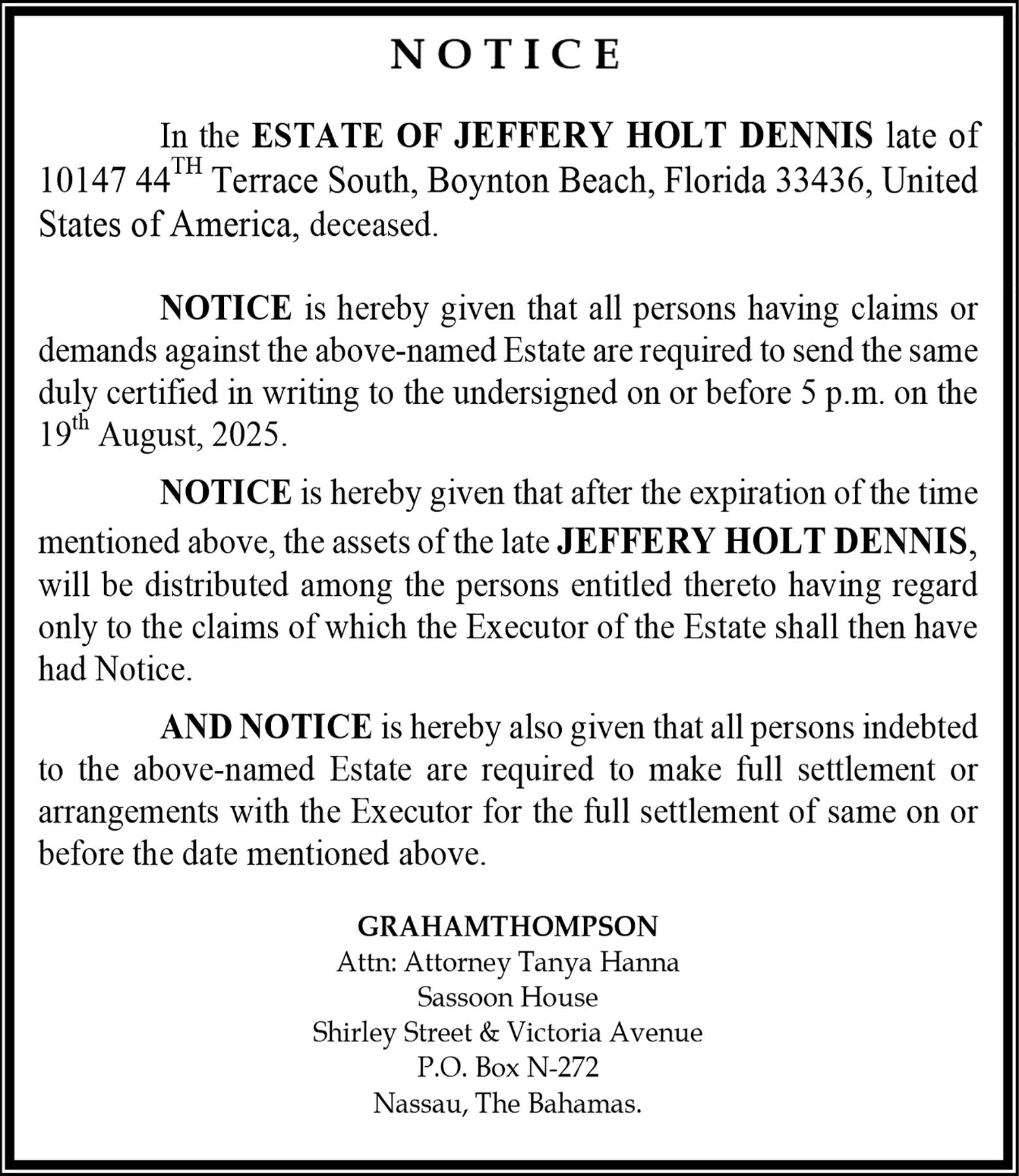

issue, with a surging rightwing populist party leading the campaign.
Sunday's vote comes after Ishiba's coalition lost a majority in the October lower house election, stung by past corruption scandals, and his unpopular government has since been forced into making concessions to the opposition to get legislation through parliament. It has been unable to quickly deliver effective measures to mitigate rising prices, including Japan's traditional staple of rice, and dwindling wages.
Trade talks with Washington U.S. President Donald Trump has added to the pressure, complaining about a lack of progress in
VOTERS
trade negotiations and the lack of sales of U.S. autos and American-grown rice to Japan despite a shortfall in domestic stocks of the grain. A 25% tariff due to take effect Aug. 1 has been another blow for Ishiba. Ishiba resisted any compromise before the election, but the prospect of a breakthrough after the election is just as unclear because the minority government would have difficulty forming a consensus with the opposition.
Populism gains traction
Frustrated voters were rapidly turning to emerging populist parties. The eight main opposition groups, however, were too fractured to forge a common platform as a united front and gain voter support as a viable alternative.
The emerging populist party Sanseito stands out with the toughest antiforeigner stance, with its "Japanese First" platform that proposes a new agency to handle policies related to foreigners. The party's populist platform also includes anti-vaccine, anti-globalism and favors traditional gender roles.
Conservative opposition groups, especially the DPP and Sanseito, gained significant ground at the Liberal Democrats' expense, while the centrist top opposition CDPJ was sluggish. The DPP quadrupled to 17 seats from four, according to interim results reported by Japanese media. Sanseito surged to 14 from just one. None of the opposition parties said that they were open to cooperating with the governing coalition. CDPJ leader Yoshihiko Noda told NHK that his priority is to form an alliance among the opposition. The spread of xenophobic rhetoric in the election campaign and on social media has triggered protests by human rights activists and alarmed foreign residents. Choice between stability or change LDP has almost continuously dominated Japan's postwar politics, contributing to its political stability and social conformity. Voters are divided between stability and change, with some voicing concern about escalating xenophobia.
Yuko Tsuji, a 43-yearold consultant, who came to a polling station inside a downtown Tokyo gymnasium with her husband, said they both support LDP for stability and unity. and voted "for candidates who won't fuel division."
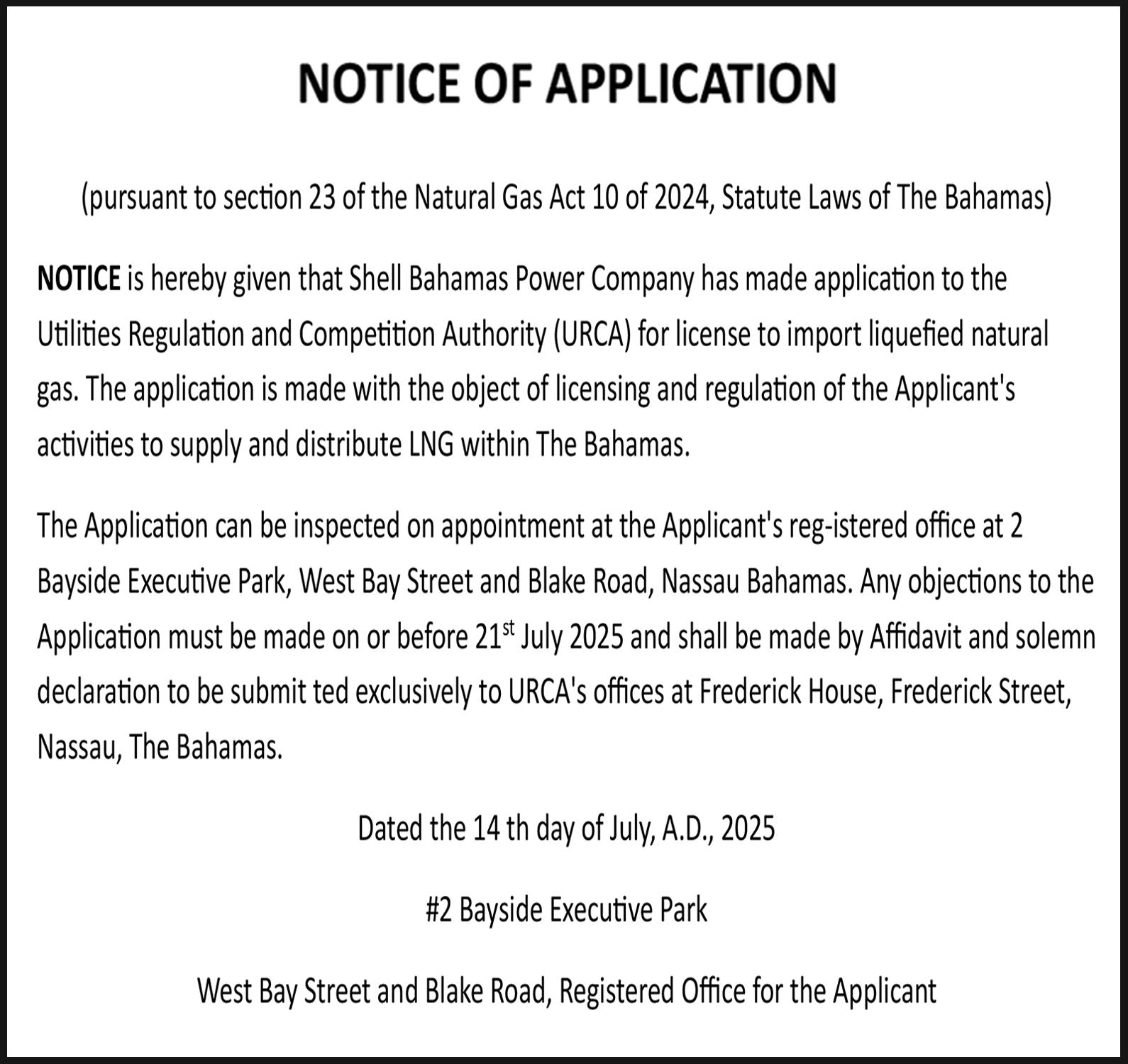
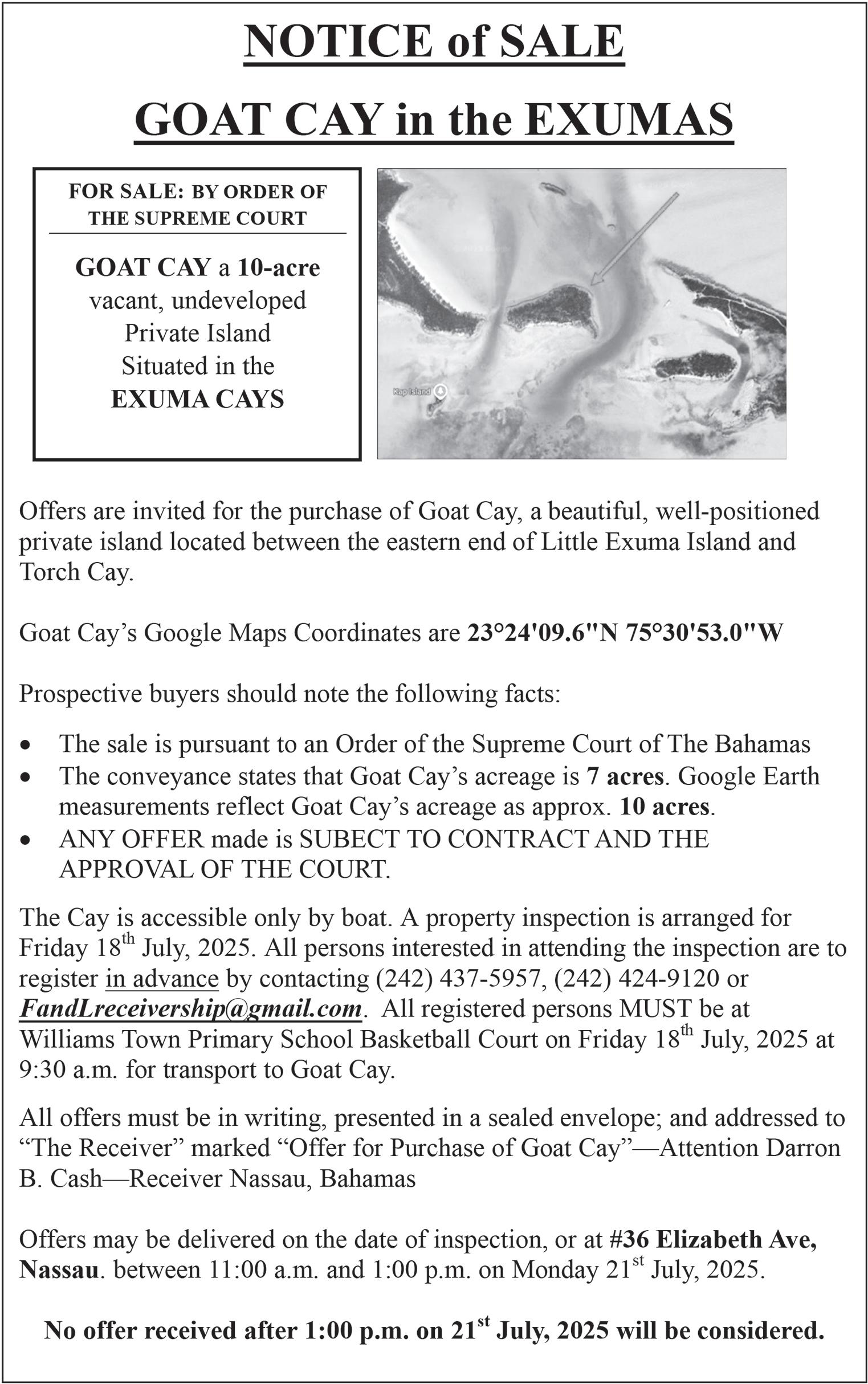
JUDGE RESTORES DEMOCRAT
TO FEDERAL TRADE COMMISSION, RULING HER FIRING BY TRUMP WAS ILLEGAL
By LEA SKENE and MARK SHERMAN Associated Press
A FEDERAL judge has restored a Democrat to the Federal Trade Commission, ruling that President Donald Trump illegally fired her earlier this year in his efforts to exert control over independent agencies across the government.
U.S. District Judge Loren AliKhan ruled late Thursday that federal law protects FTC commissioners from being removed by the president without cause, citing a key 1935 U.S. Supreme Court decision involving the FTC.
The decision allows Rebecca Kelly Slaughter to resume her duties as commissioner. The FTC website had been updated by Friday morning to show that Slaughter is among four sitting commissioners.
Attorneys for the Trump administration almost immediately declared their intent to appeal, and the case could make its way to the Supreme Court. The conservative-led court already has narrowed the reach of the 90-year-old
decision, known as Humphrey's Executor, and some justices have called for overturning it altogether.
The high court also permitted Trump to fire the heads of other independent agencies. In May, the court allowed Trump to remove members of the National Labor Relations Board and the Merit Systems Protection Board, despite lower court rulings that Humphrey's Executor should protect them from arbitrary dismissal.
The justices are currently weighing an emergency appeal from the administration to oust three Democratic members of the Consumer Product Safety Commission. Trump fired them in May, but a federal judge restored them to their positions a month later.
The legal fight over the firings also could extend to the Federal Reserve and the prospect of Trump firing Fed chairman Jerome Powell. The justices suggested in May that Trump may not have the same freedom to upend the leadership of the Fed, describing it as "a uniquely structured, quasi-private entity."
In her opinion, AliKhan said she was required to abide by the Humphrey's Executor decision, in which the court rebuffed President Franklin Roosevelt and held that FTC commissioners could be removed only for cause, not at the president's whim.
She said her ruling would uphold "clearly established law that has been enacted by a coequal branch of government, reaffirmed by another coequal branch, and acquiesced to by thirteen executives over the course of ninety years."
But the judge acknowledged that hers probably would not be the last word. "Defendants are, of course, free to take their quarrels with Humphrey's Executor to the Supreme Court. This court has no illusions about where this case's journey leads," she wrote.
Trump fired Slaughter and Alvaro Bedoya, the commission's two Democratic members in March. The FTC is a regulator created by Congress that enforces consumer protection measures and antitrust legislation. Its seats typically include three
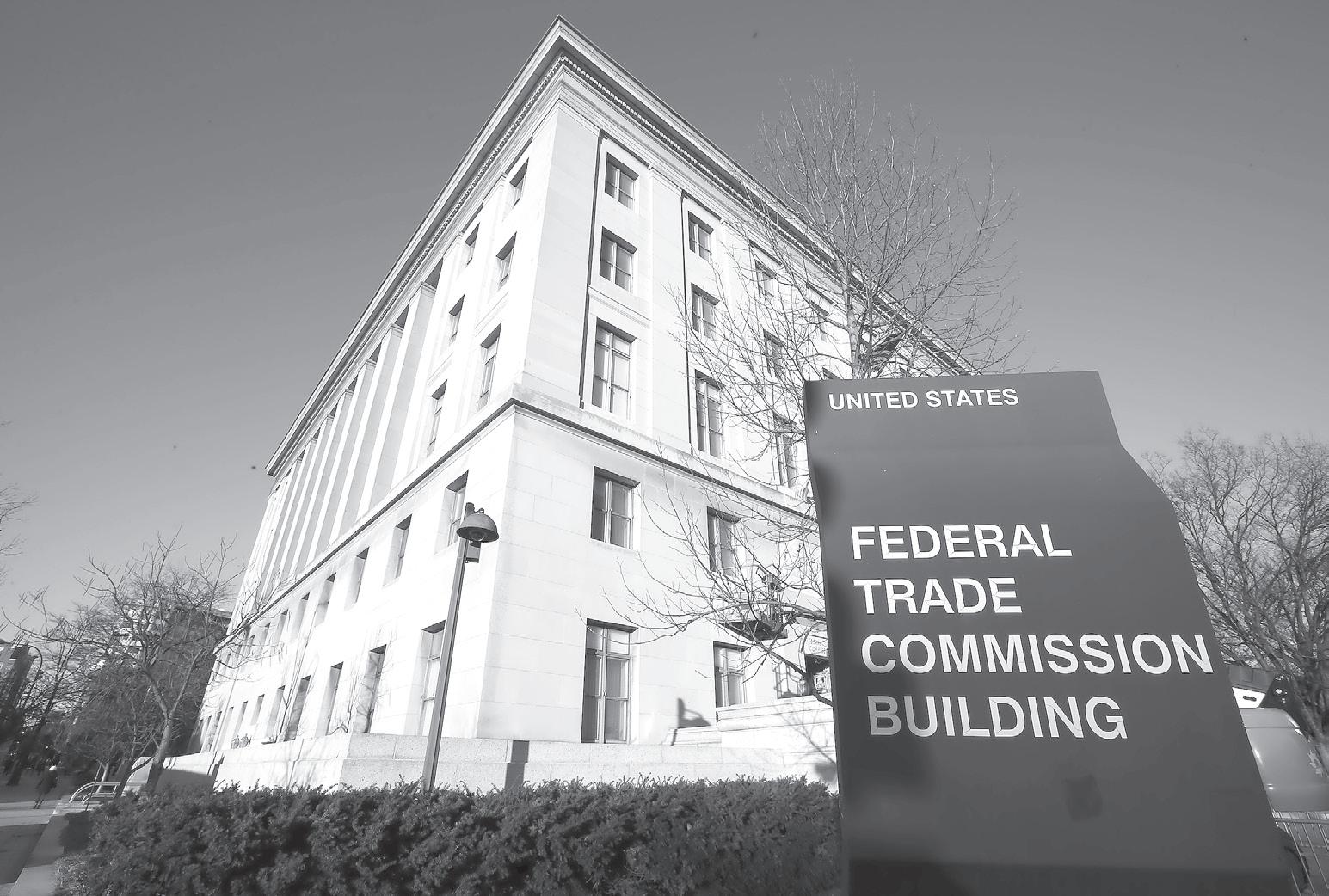
members of the president's party and two from the opposing party. The commissioners sued to reclaim their jobs, saying they'd been dismissed illegally. Slaughter has four years left in her term as commissioner. Bedoya submitted his resignation in June, and AliKhan dismissed his claim as a result.
"As the Court recognized today, the law is clear, and I look forward to getting back to work," Slaughter said in a statement Thursday.
During a May court hearing in federal court in Washington, D.C., plaintiffs' attorneys warned against granting the president "absolute removal power over any executive officer," saying it would effectively eliminate an
Tech company CEO resigns after controversy over video captured at Coldplay concert
By ALEX VEIGA AP Business Writer
THE IT company CEO captured in a widely circulated video showing him embracing an employee at a Coldplay concert has resigned.
Andy Byron resigned from his job as CEO of Cincinnati-based Astronomer Inc., according to a statement posted on LinkedIn by the company Saturday.
"Astronomer is committed to the values and culture that have guided

us since our founding. Our leaders are expected to set the standard in both conduct and accountability, and recently, that standard was not met," the company said in its post on LinkedIn. The move comes a day after the company said that Byron had been placed on leave and the board of directors had launched a formal investigation into the jumbotron incident, which went viral. A company spokesman later confirmed in a statement to AP that it was Byron and
NOTICE is hereby given that LENER PIERRE DESILUS of P.O.Box N-3331, Stapledon Gardens, Nassau, The Bahamas is applying to the Minister responsible for Nationality and Citizenship, for Registration Naturalization as a citizen of The Bahamas, and that any person who knows any reason why registration/ naturalization should not be granted, should send a written and signed statement of the facts within twenty-eight days from the 14th day of July 2025 to the Minister responsible for nationality and Citizenship, P.O. Box N-7147, Nassau, New Providence, The Bahamas.

the Minister responsible for Nationality and Citizenship, for registration/ naturalization as a citizen of The Bahamas, and that any person who knows any reason why registration/ naturalization should not be granted, should send a written and signed statement of the facts within twenty-eight days from the 21st day of July,
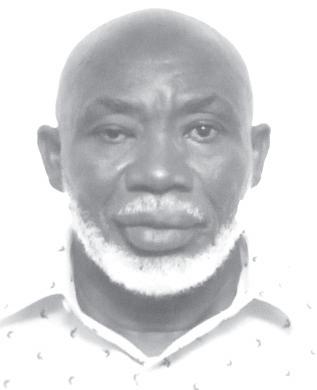
NOTICE is hereby given that WILFRID LUBIN of Eight Street The Grove, Nassau, Bahamas is applying to the Minister responsible for Nationality and Citizenship, for Registration Naturalization as a citizen of The Bahamas, and that any person who knows any reason why registration/naturalization should not be granted, should send a written and signed statement of the facts within twenty-eight days from the 14th day of July 2025 to the Minister responsible for nationality and Citizenship, P.O. Box N-7147, Nassau,
Astronomer chief people officer Kristin Cabot in the video.
The short video clip shows Byron and Cabot as captured on the jumbotron at Gillette Stadium in Foxborough, Massachusetts, during a Coldplay concert on Wednesday.
Lead singer Chris Martin asked the cameras to scan the crowd for his "Jumbotron Song," when he sings a few lines about the people the camera lands on.
"Either they're having an affair or they're just very shy," he joked.
Internet sleuths identified the man as the chief executive officer of a U.S.-based company and the woman as its chief people officer.
Pete DeJoy, Astronomer's cofounder and chief product officer, has been tapped as interim CEO while the company conducts a search for Byron's successor.
Most concert venues warn attendees that they can be filmed
It's easy to miss, but most concert venues have signs informing the audience that they could be filmed during the event. Look for them on the walls when you arrive and around the bar areas or toilets. It's common practice especially when bands like to use performances for music videos or concert films.
The venue in this case, Gillette Stadium in Foxborough, also has a privacy policy online which states: "When you visit our location or attend or participate in an event at our location, we may capture your image, voice and/or likeness, including through the use of CCTV cameras and/or when we film or photograph you in a public location."
Once captured, a moment can be shared widely
important check on his power. "That has never been the case in this country," said attorney Aaron Crowell. "That's not the law. That has never been the law."
A politicized FTC also could favor powerful corporations while driving up prices for consumers, the lawyers for the fired commissioners said.
But attorneys for the Trump administration argued that the FTC's role has expanded since the 1930s, and as such, its members should answer directly to the president.
"The president should be able to remove someone who is actively blocking his policies, for example,"
Justice Department lawyer Emily Hall said during the hearing.
of presidents before Trump who didn't try to push the limits.
Commissioners are appointed by the president and confirmed by the Senate. They serve seven-year terms that are staggered to prevent multiple vacancies at once. They can be fired for displaying specific bad behaviors, including inefficiency, neglect of duty and malfeasance in office.
Trump told Bedoya and Slaughter that he was dismissing them because their service on the commission was inconsistent with his administration's priorities, according to the lawsuit.

"They probably would have got away with it if they hadn't reacted," said Alison Taylor, a clinical associate professor at New York University's Stern School of Business. And by the time the alleged identities emerged on social media, it hit a classic nerve around "leaders acting like the rules don't apply to them," she added.
Still, Taylor and others stress how quickly such a video can lead to an internet search to find the people involved — and note that it's important to remember that such "doxing" isn't just reserved for famous people.
Beyond someone simply spotting a familiar face and spreading the word, technological advances, such as

for Registration Naturalization as a citizen of The Bahamas, and that any person who knows any reason why registration/ naturalization should not be granted, should send a written and signed statement of the facts within twenty-eight days from the 14th day of July 2025 to the Minister responsible for nationality and Citizenship,

the rising adoption of artificial intelligence, have made it easier and faster overall to find just about anyone in a viral video today.
"It's a little bit unsettling how easily we can be identified with biometrics, how our faces are online, how social media can track us — and how the internet has gone from being a place of interaction, to a gigantic surveillance system," said Mary Angela Bock, an associate professor in the University of Texas at Austin's School of Journalism and Media. "When you think about it, we are being surveilled by our social media. They're tracking us in exchange for entertaining us."
NOTICE
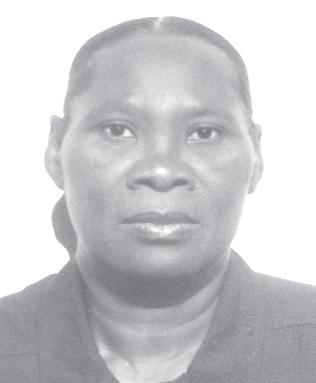
as a citizen of The Bahamas, and that any person who knows any reason why registration/naturalization should not be granted, should send a written and signed statement of the facts within twenty-eight days from the 14th day of July 2025 to the Minister responsible for nationality and Citizenship, P.O. Box N-7147, Nassau, New Providence, The Bahamas.

NOTICE is hereby given that
RONALD YDORE of Marsh Harbour, Abaco, The Bahamas, is applying to the Minister responsible for Nationality and Citizenship, for Registration Naturalization as a citizen of The Bahamas, and that any person who knows any reason why registration/naturalization should not be granted, should send a written and signed statement of the facts within twenty-eight days from the 14th day of July 2025 to the Minister responsible for nationality and Citizenship, P.O. Box N-7147, Nassau, New Providence, The Bahamas.
DID MONEY OR POLITICS CAUSE COLBERT CANCELLATION?
EITHER WAY, THE ECONOMICS ARE TOUGH FOR TV
By DAVID BAUDER AP Media Writer
CBS says its decision to end Stephen Colbert's late-night comedy show is financial, not political. Yet even with the ample skepticism about that explanation, there's no denying the economics were not working in Colbert's favor.
The network's bombshell announcement late Thursday that the "Late Show" will end next May takes away President Donald Trump's most prominent TV critic and the most popular entertainment program in its genre.
The television industry's declining economic health means similar hard calls are already being made with personalities and programming, with others to be faced in the future. For the late-night genre, there are unique factors to consider.
As recently as 2018, broadcast networks took in an estimated $439 million in advertising revenue for its late-night programs, according to the advertising firm Guidelines. Last year, that number dwindled to $220 million.
Once a draw for young men, now they've turned away
Late-night TV was a particular draw for young men, considered the hardest-to-get and most valuable demographic for

advertisers. Increasingly, these viewers are turning to streaming services, either to watch something else entirely or catch highlights of the late-night shows, which are more difficult for the networks to monetize. More broadly, the muchpredicted takeover of viewers by streaming services is coming to pass. The Nielsen company reported that during the last two months, for the first time ever, more people consumed programming on services like YouTube and Netflix than on ABC, CBS and NBC or any cable network.
Networks and streamers spent roughly $70 billion on entertainment shows and $30 billion for sports rights last year, said Brian Wieser, CEO of Madison & Wall, an advertising consultant and data services firm. Live sports is the most dependable magnet for viewers and costs for its rights are expected to increase 8% a year over the next decade. With television viewership declining in general, it's clear where savings will have to come from.
Wieser said he does not know whether Colbert's show is profitable or not for CBS and parent company
Paramount Global, but he knows the direction in which it is headed. "The economics of television are weak," he said.
In a statement announcing the cancellation, George Cheeks, Paramount Global's president and chief executive officer, said that "This is purely a financial decision against a challenging backdrop in late night. It is not related in any way to the show's performance, content or other matters happening at Paramount."
Cheeks' problem is that not everyone believes him. Colbert is a relentless critic of Trump, and earlier
Trump's pivot from aid to trade leaves Africa wary as it faces tariffs and uncertainty
By FARAI MUTSAKA Associated Press
WHEN U.S. President Donald Trump met five African leaders in Washington this month, his lack of familiarity with the continent was on display. He praised Liberian President Joseph Boakai's English
— Liberia's official language — and gestured at another leader to wrap up remarks. But the bigger takeaway was Trump's pledge to transform U.S.-Africa relations: a shift from aid to trade, even as the region reels from his steep tariffs and sweeping aid cuts.
African leaders offered minerals from manganese to uranium and possibly lithium. Senegal's president even sought to leverage Trump's love of golf by inviting him to build a course. Yet many nations are anxious about Washington's new path.
Here's a look at Trump's new 'trade not aid' policy toward African nations: A commercial diplomacy approach
After slashing billions in foreign aid, including shutting down the U.S. Agency for International Development — which provided
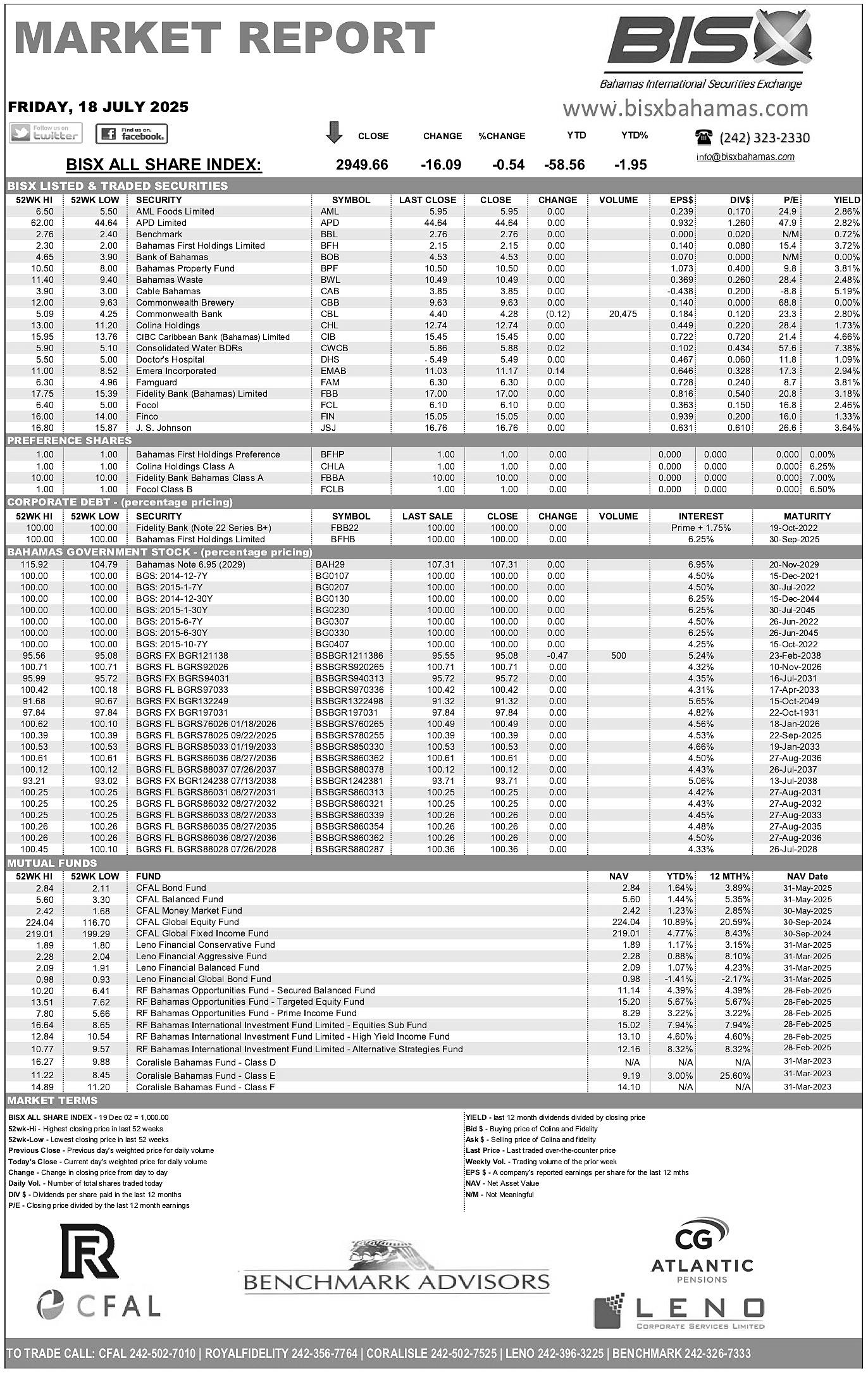
this week pointedly criticized Paramount's decision to settle Trump's lawsuit against CBS over a "60 Minutes" interview with Kamala Harris. He called Paramount's $16 million payment to Trump a "big fat bribe," since the company is seeking the administration's approval of its merger with Skydance Media.
On Friday, the Writers Guild of America called for an investigation by New York's attorney general into whether Colbert's cancellation is itself a bribe, "sacrificing free speech to curry favor with the Trump administration as the company looks for merger approval."
CBS' decision made this a pivotal week for the future of television and radio programming. Congress stripped federal funding for PBS and NPR, threatening the future of shows on those outlets.
Journey Gunderson, executive director of the National Comedy Center, called the decision to end Colbert's show the end of an era.
"Late-night television has historically been one of comedy's most audience-accessible platforms — a place where commentary meets community, night after night," Gunderson said. "This isn't just the end of a show. It's the quiet
removal of one of the few remaining platforms for daily comedic commentary. Trump celebrates Colbert's demise
Trump, who has called in the past for CBS to terminate Colbert's contract, celebrated the show's upcoming demise. "I absolutely love that Colbert got fired," the president wrote on Truth Social. "His talent was even less than his ratings."
Some experts questioned whether CBS could have explored other ways to save money on Colbert. NBC, for example, has cut costs by eliminating the band on Seth Meyers' late-night show and curtailing Jimmy Fallon's "Tonight" show to four nights a week.
Could CBS have saved more money by cutting off the show immediately, instead of letting it run until next May, which sets up an awkward "lame duck" period? Then again, Colbert will keep working until his contract runs out; CBS would have had to keep paying him anyway.
CBS recently cancelled the "After Midnight" show that ran after Colbert. But the network had signaled earlier this year that it was prepared to continue that show until host Taylor Tomlinson decided that she wanted to leave, noted Bill Carter, author of "The Late Shift."
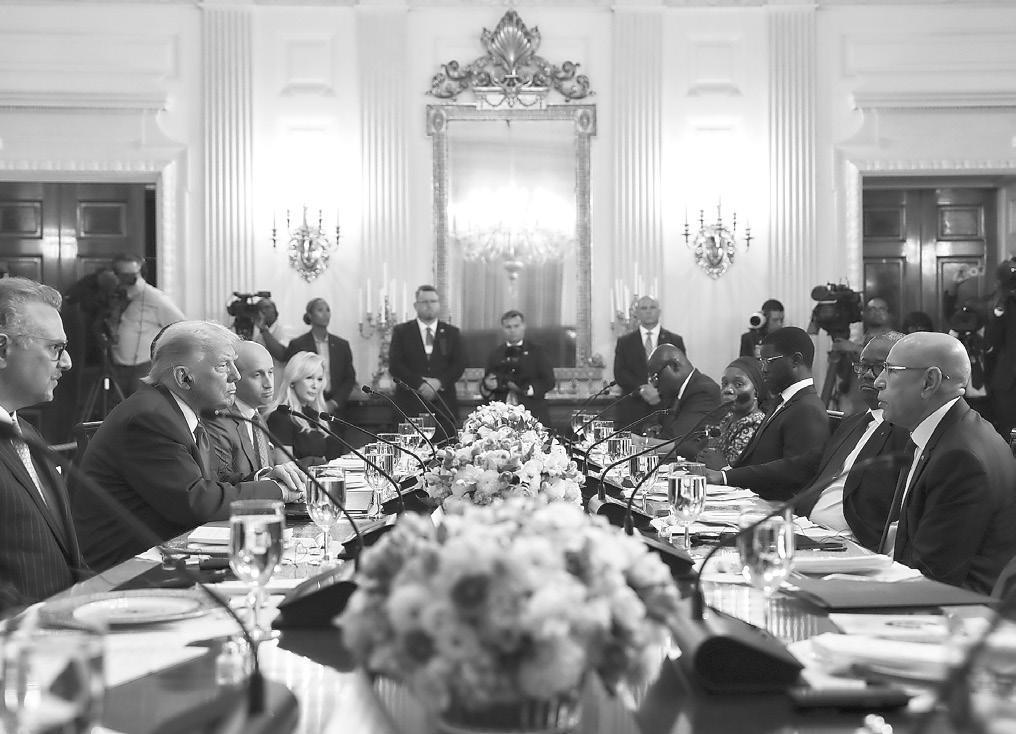
over $12 billion in humanitarian assistance in 2024 alone — the Trump administration says it is forging a new approach: "commercial diplomacy." Trade, not aid, is the order of the day.
"It is now truly our policy for Africa," said Troy Fitrell, the top U.S. diplomat for Africa, when announcing the strategy in Abidjan, Ivory Coast, in May. Ambassadors will now be judged not by aid projects but on "how well they support" local businesses and "how effectively they advocate for U.S. business and the number of deals they facilitate," he said. Africa accounts for less than 1% of U.S. goods trade, but Fitrell called it "the world's largest untapped market," projecting its purchasing power could surpass $16 trillion by 2050.
Early deals, lingering doubts Washington touts quick progress: 33 agreements worth $6 billion in Trump's first 100 days, plus $2.5 billion in commitments at a U.S.-Africa business summit in June. Projects span grain storage and digital infrastructure in Angola, energy ventures in Rwanda, Sierra Leone and Congo, and tourism in Ethiopia. Still, many worry about the costs. Job losses and economic pain from tariffs are mounting even as Washington celebrates these wins. Trump did not invent the idea of trade over aid. African leaders have pushed for this since the 1970s. The problem, critics say, is the caveat of tariffs and uncertainty over the African Growth and Opportunity Act (AGOA), the U.S. flagship program for trade with the continent.
"In reality, these tariffs are not about trade
balances. It's economic warfare," said the Alternative Information and Development Centre, a South African NGO. Fears that jobs could go Trump has imposed a 30% tariff on selected South African goods and threatens another 10% for nations aligned with the BRICS bloc of developing economies. South Africa's Automotive Business Council says vehicle exports to the U.S. have plunged over 80%, warning that tariffs "strike at the heart of South Africa's industrialization agenda." More than 100,000 jobs, mostly in auto and agriculture, are at risk, the council says.
Smaller nations are also reeling. Lesotho declared a state of disaster after being hit with 50% duties — the second-highest rate after China — before Trump announced a 90-day pause. About 12,000 textile jobs in Lesotho hang in the balance, according to its Minister of Trade, Industry, and Business Development, Mokhethi Shelile. From vanilla farmers in Madagascar to cocoa growers in Ivory Coast and oil exporters in Nigeria, tariffs have shaken economies and raised doubts about Washington's intent.
"The U.S. certainly can't have it both ways," said Brendon Verster, an economist at Oxford Economics Africa. "The 'aid to trade' stance risks leaving Africa behind once the U.S. has gotten what it wanted, which will probably be critical minerals."
An agreement on the brink
AGOA, enacted in 2000 and renewed in 2015, allows duty-free U.S. access for nearly 2,000 goods from 32 African nations. It expires in September, with no clear sign that it will be renewed.
TRUMP ADMINISTRATION IMPOSES LIMITS ON MEXICAN FLIGHTS AND THREATENS DELTA ALLIANCE IN TRADE DISPUTE
By JOSH FUNK Associated Press
THE Trump administration imposed new restrictions Saturday on flights from Mexico and threatened to end a longstanding partnership between Delta Air Lines and Aeromexico in response to limits the Mexican government placed on passenger and cargo flights into Mexico City several years ago.
Transportation Secretary Sean Duffy said Mexico's actions to force airlines to move out of the main Benito Juarez International Airport to the newer Felipe Angeles International Airport more than 30 miles (48.28 kilometers) away violated a trade agreement between the two countries and gave domestic airlines an unfair advantage.
Mexico is the top foreign destination for Americans with more than 40 million passengers flying there last year.
"Joe Biden and Pete Buttigieg deliberately allowed Mexico to break our bilateral aviation agreement," Duffy said, referring to the previous president and his transportation secretary. "That ends today. Let these actions serve as a warning to any country who thinks it can take advantage of the U.S., our carriers, and our market. America First means fighting for the fundamental principle of fairness."
All Mexican passenger, cargo and charter airlines will now be required to submit their schedules to the Transportation Department and seek government approval of their flights until Duffy is satisfied with
the way Mexico is treating U.S. airlines. It's not immediately clear how Duffy's actions might affect the broader trade war with Mexico and negotiations over tariffs. A spokesperson for Mexico's President Claudia Sheinbaum didn't reply immediately to a request for comment. Sheinbaum didn't mention the new restrictions during either of her two speaking events on Saturday.
Delta and Aeromexico have been fighting the Transportation Department's efforts to end their partnership that began in 2016 since early last year.
The airlines have argued that it's not fair to punish them for the Mexican government's actions, and they said ending their agreement would jeopardize nearly two dozen routes and $800
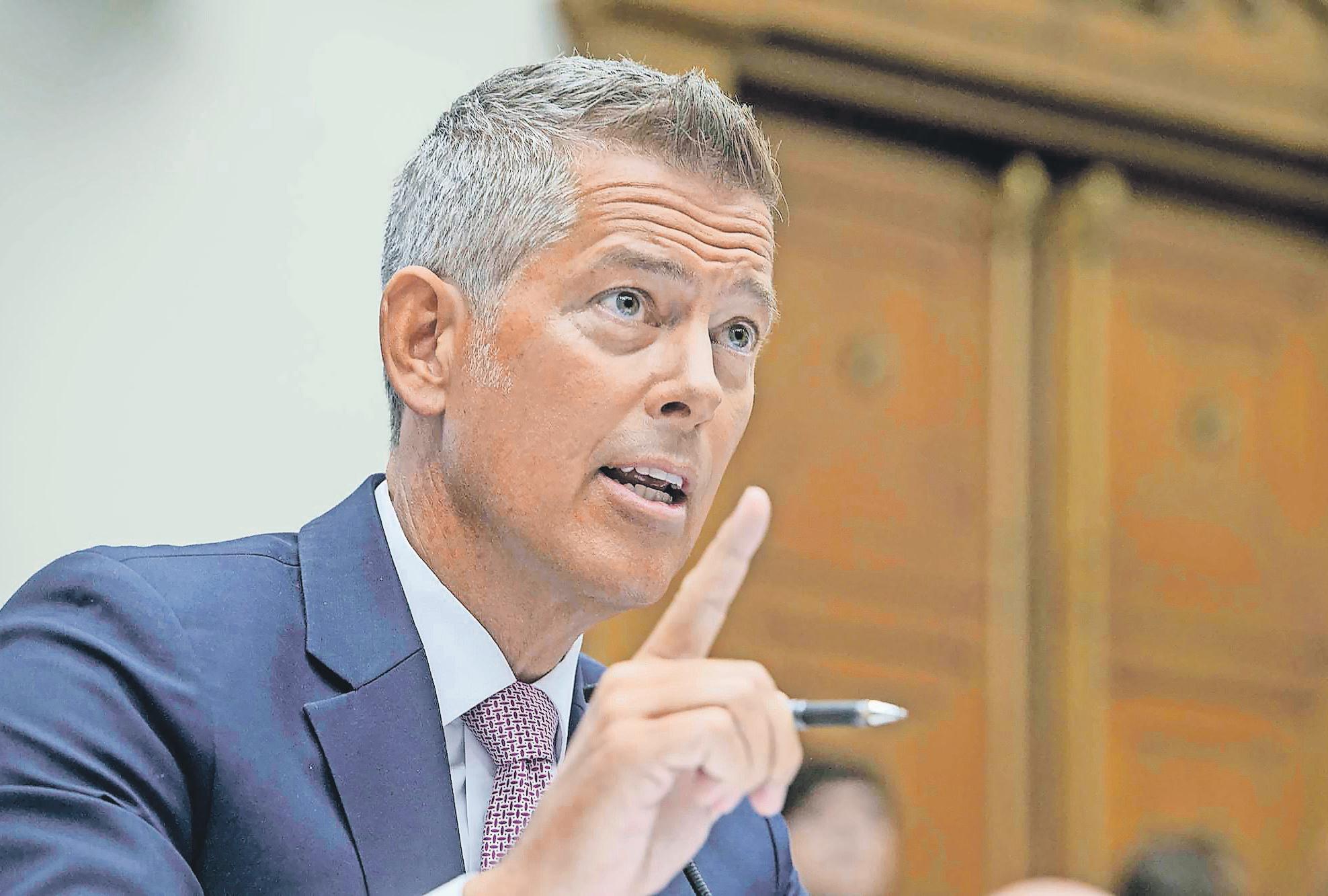
million in benefits to both countries' economies that come from tourism spending and jobs.
"The U.S. Department of Transportation's tentative proposal to terminate its approval of the strategic and pro-competitive partnership between Delta and Aeromexico would cause significant harm to consumers traveling between the
New airport scanners are better at spotting liquid explosives, but many airports lack them
By JOSH FUNK Associated Press
TRAVELERS cele-
brated the suggestion that American airports might soon ease restrictions on liquids in carry-on bags that create endless hassles at security checkpoints, but more than a third of all airports around the country still haven't upgraded their screening systems to reliably detect liquid explosives that could bring down a plane.
It may be annoying to have to dump water and other drinks before going through security, but the challenge is to detect the difference between things like harmless hair gel and more sinister substances.
The threat nearly materialized in an attack in 2006, when authorities in the United Kingdom arrested a group that was plotting to blow holes in airliners with a homemade mixture of chemicals in sports drink bottles.
Security experts remain concerned about the vulnerabilities that were exposed by that plot.
Comments this week by Homeland Security Secretary Kristi Noem got travelers excited about the prospect of one day being able to fly with more than 3 ounces of their shampoos and gels and not having to throw out the beverage they just bought.
Gene
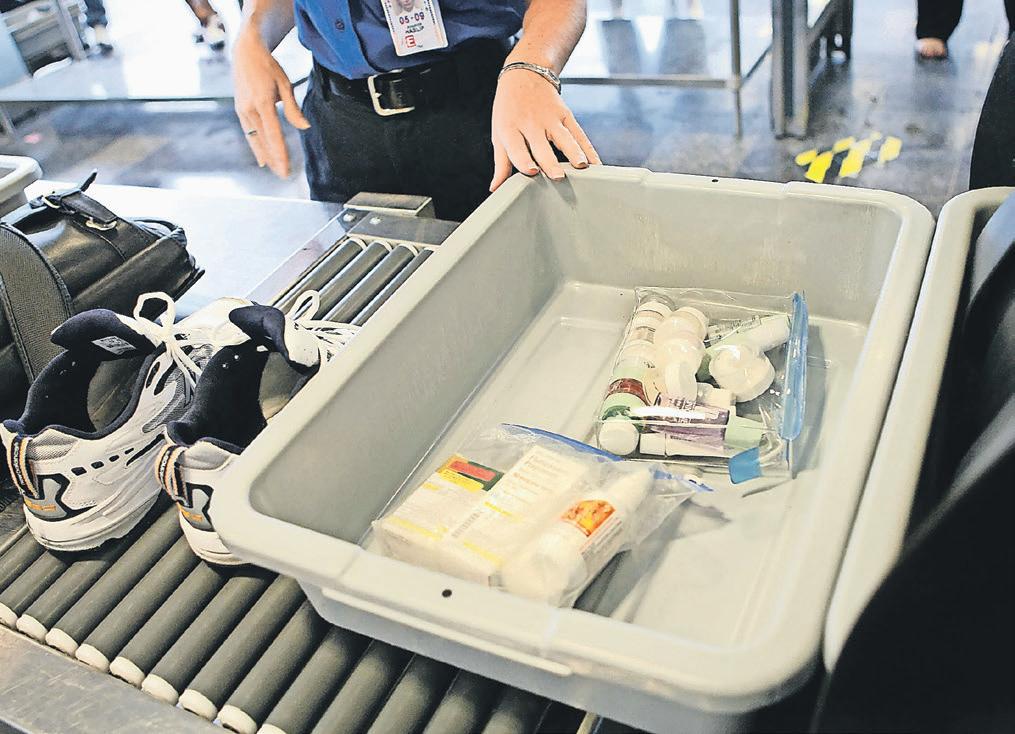
"The liquids, I'm questioning. So that may be the next big announcement, is what size your liquids need to be," Noem said. "We have put in place in TSA a multilayered screening process that allows us to change some of how we do security and screening so it's still as safe."
A Transportation Security Administration spokesperson said Noem and the agency "are constantly looking for ways to enhance security, and improve the travel experience for the public." New liquids rules aren't ready
Any changes will come through the same official
therapy maker
channels that TSA used to announce this month that travelers can keep their shoes on at checkpoints. That change offers relief from a rule adopted after "shoe bomber" Richard Reid's failed attempt to take down a flight from Paris to Miami in late 2001 with a small explosive device hidden in his footwear.
The limits on liquids were triggered by the 2006 U.K. arrests. Three ringleaders were eventually convicted.
A massive surveillance operation
Prosecutors told the jury in that case that authorities uncovered the plot after secretly searching the
Sarepta
tells FDA it won’t halt shipments despite patient deaths
By MATTHEW PERRONE AP Health Writer
DRUGMAKER Sarepta
Therapeutics said late Friday it won't comply with a request from the Food and Drug Administration to halt all shipments of its gene therapy following the death of a third patient receiving one of its treatments for muscular dystrophy. The highly unusual move is a latest in a string of events that have hammered the company's stock for weeks and recently forced it to lay off 500 employees. The company's decision not to comply with the FDA also places future availability of its leading therapy, called Elevidys, in doubt.
The FDA said in a statement Friday night that officials met with Sarepta and requested it suspend all sales but "the company refused to do so." The agency has the authority to pull drugs from the market, but the cumbersome regulatory process can take months or even years. Instead, the agency usually makes an informal request and companies almost always comply.
"We believe in access to drugs for unmet medical needs but are not afraid to take immediate action when a serious safety signal emerges," FDA Commissioner Marty Makary said in a statement.
Elevidys is the first gene therapy approved in the U.S. for Duchenne's muscular dystrophy, the fatal muscle-wasting disease that affects males, though it has faced scrutiny since its clearance in 2023. The one-time treatment received accelerated approval against the recommendations of some FDA scientists who doubted its effectiveness.
The FDA granted full approval last year and expanded the therapy's use to patients 4 years and older, including those who can no longer walk. Previously, it was only available for younger patients who were still walking.
Sarepta said Friday that its scientific review showed "no new or changed safety signals" for younger patients with Duchenne's who have earlier stages of the disease. The company said it plans to keep the
drug available for those patients.
"We look forward to continued discussions and sharing of information with FDA," the company said in a statement.
Sarepta halted shipments last month of the therapy for older boys with Duchenne's, which gradually destroys muscle and skeletal strength, resulting in early death. The move followed the deaths of two teenage boys taking the therapy.
The company also confirmed a third death Friday: a 51-year-old patient who was taking an experimental gene therapy in a trial for a different form of muscular dystrophy. Sarepta said it reported the death to the FDA on June 20. The FDA said Friday it placed that trial on hold.
Sarepta noted that the gene therapy involved in the incident uses "a different dose and is manufactured using a different process," than Elevidys.
All three patient deaths were linked to liver injury, a side effect noted in Sarepta's prescribing information.
luggage of a man who was on their radar for security concerns after he returned from Pakistan and found the unusual combination of the Tang powdered soft drink and a large number of batteries, according to the BBC. That triggered the surveillance operation that eventually grew to include more than 200 officers.
Agents discovered what appeared to be a bomb factory in a London apartment where odd devices were being constructed out of drink bottles. The plot didn't make sense until authorities discovered that the men were researching flight timetables and realized they were only trying to make an explosive big enough to rip a hole in a plane.
The meaning of coded emails to contacts in Pakistan only became clear after the arrests, when authorities realized that the quantities of Calvin Klein aftershave being discussed in messages matched the amount of hydrogen peroxide the conspirators had purchased.
Longstanding liquid restrictions
Ever since then, the TSA and authorities in other countries have limited carry-on liquids and gels to 3.4 ounces (100 milliliters)
U.S. and Mexico, as well as U.S. jobs, communities, and transborder competition,"
Delta said in a statement.
Aeromexico's press office said it was reviewing the order and intended to present a joint response with Delta in the coming days.
But the order terminating approval of the agreement between the airlines wouldn't take effect until October, and the airlines are likely to continue fighting that decision. The airlines said in a previous filing fighting the order that it believes the loss of direct flights would prompt over 140,000 American tourists and nearly 90,000 Mexican tourists not to visit the other country and hurt the economies of both countries with the loss of their spending.
because officials believe that amount is too small to create an explosion capable of taking down a plane. The restriction covered all types of liquids, because X-ray machines at checkpoints couldn't differentiate between explosive and harmless ones.
The United Kingdom was planning to ease its restrictions last year to allow people to carry up to 2 liters (about half a gallon) of liquid, but that was delayed because several major airports still didn't have the new scanners that use computed tomography, commonly known as a CT scan, to produce clearer images.
Advanced new screening machines
The new machines allow screeners to switch between two-dimensional and three-dimensional images and turn them to see what may be lurking, said Johnny Jones, secretary treasurer of the chapter of the American Federation of Government Employees that represents TSA workers.
"It's just a totally lifechanging situation," said Jones, who has worked as a screener since the agency was created. "It's a difference of being able to see something that would have been hidden by something that you can now see clear as day with the new technology. It eliminates the guesswork."
Many airports still use the old tech
The problem is that only 255 of the 432 airports across the United States have new CT scanners installed, the interim head of the TSA told Congress this spring. The biggest airports got them first, but they are not expected to be everywhere until 2043.
It's possible that a change in carry-on liquid policy could be implemented just at the biggest airports, but that could lead to confusion if travelers, are, say, allowed to bring full bottles on departure only to have them confiscated when they return.
The scanners cost more than $2 million apiece, and they are so much bigger than the old X-ray machines that sometimes floors must be reinforced and checkpoints have to be redesigned.
"I think you need to hold off till we get more systems deployed. I think this one's a little too early," said Jeff Price, who teaches aviation security at Metropolitan State University of Denver and has co-authored books on the subject. "The keep your shoes on — I can get on board with that provided we continue to do random screenings. But the liquids, I think we're too early on that. There's other layers of security. Yeah, I know that. But not too many of them that prevent this type of attack."

Wall Street closes a recordbreaking week with a quiet finish
By STAN CHOE AP Business Writer
WALL Street closed its third winning week in the last four with a quiet finish on Friday.
The S&P 500 edged down by a whisper, less than 0.1%, after setting its alltime high the day before.
The Dow Jones Industrial Average fell 142 points, or 0.3%, and the Nasdaq composite edged up by less than 0.1% to add its own record.
Norfolk Southern chugged 2.5% higher after an AP source said it's talking with Union Pacific about a merger to create the largest railroad in North America, one that would connect the East and West coasts. Any such deal, though, would likely face tough scrutiny from U.S. regulators. Union Pacific's stock fell 1.2%.
The heaviest weight on the market, meanwhile, was Netflix, which fell 5.1% despite reporting a stronger-than-expected profit.
Analysts said it wasn't a surprise given the stock had already soared
43% for the year so far coming into the day, six times more than the gain for the S&P 500.
American Express likewise delivered a betterthan-expected profit report, but its stock lost 2.3%.
Analysts pointed to slowing growth in some underlying trends, such as the number of cards it issued.
Exxon Mobil sank 3.5% and also tugged on the market. It had been challenging Chevron's $53 billion deal to buy Hess, but an arbitration ruling in Paris about Hess assets off Guyana's coast allowed the buyout to go through. Chevron fell 0.9% after losing an early gain.
Stronger-than-expected profit reports for the spring did help several stocks rally. Charles Schwab climbed 2.9%, Regions Financial jumped 6.1% and Comerica added 4.6%.
All told, the S&P 500 slipped 0.57 to 6,296.79 points. The Dow Jones Industrial Average dropped 142.30 to 44,342.19, and the Nasdaq composite rose 10.01 to 20,895.66.
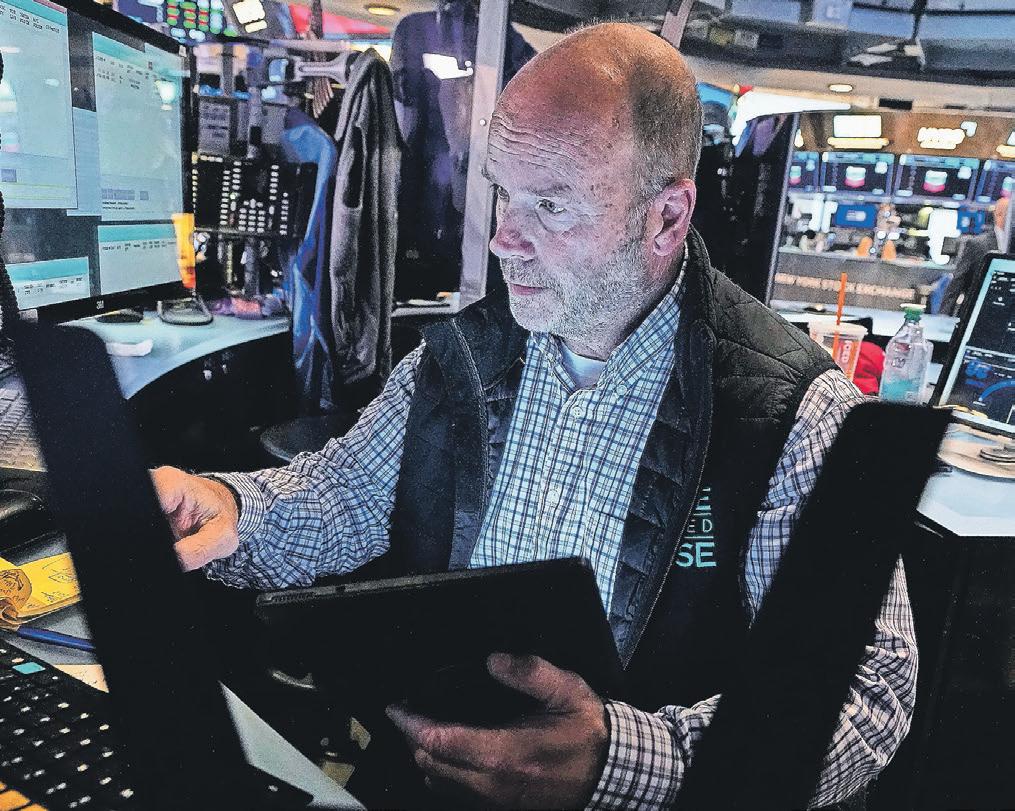
In the bond market,
Treasury yields eased after a report suggested U.S. consumers may be feeling less fearful about coming inflation. They're bracing for inflation of 4.4% in the year ahead, down from last month's projection of 5%, according to preliminary results from a University of Michigan survey.
That's important because expectations for high
inflation can feed into behaviors that create a vicious cycle that keeps inflation high. Overall sentiment among consumers, meanwhile, was a hair better than economists expected but still well below its historical average. "Consumers are unlikely to regain their confidence in the economy unless they feel assured that inflation is unlikely to worsen, for
example if trade policy stabilizes for the foreseeable future," according to Joanne Hsu, the survey's director. The yield on the 10-year Treasury sank to 4.42% from 4.47% late Thursday. The two-year Treasury yield, which more closely tracks expectations for what the Federal Reserve will do with its short-term rates, also dropped. It fell to 3.87% from 3.91%.
A top Fed official, Gov. Chris Waller, said late Thursday that the Fed should cut its overnight interest rate as soon as its next meeting in a couple weeks. That follows sharp criticism from President Donald Trump, who has been castigating the Fed for holding interest rates steady this year instead of cutting them, as it did late last year.
Lower rates could give the economy a boost, and Trump has implied they could help the U.S. government save money on its debt payments, though that's uncertain. The interest rates Washington has
to pay on its longer-term debt can depend more on what bond investors think than on what the Fed does, and they can even move in opposite directions.
The chair of the Fed, meanwhile, has been insisting that he wants to see more data about how Trump's tariffs will affect the economy and inflation before the Fed makes its next move. The downside of lower interest rates is that they can give inflation more fuel, and prices may already be starting to feel the upward effects of tariffs. Traders on Wall Street think it's much more likely that the Fed will resume cutting interest rates in September, rather than later this month, according to data from CME Group. In stock markets abroad, indexes were mixed across Europe and Asia. Hong Kong's Hang Seng jumped 1.3%, but Tokyo's Nikkei 225 slipped 0.2% ahead of an election for the upper house of parliament on Sunday that could wipe out the ruling coalition's upper house majority.





















































































































































































